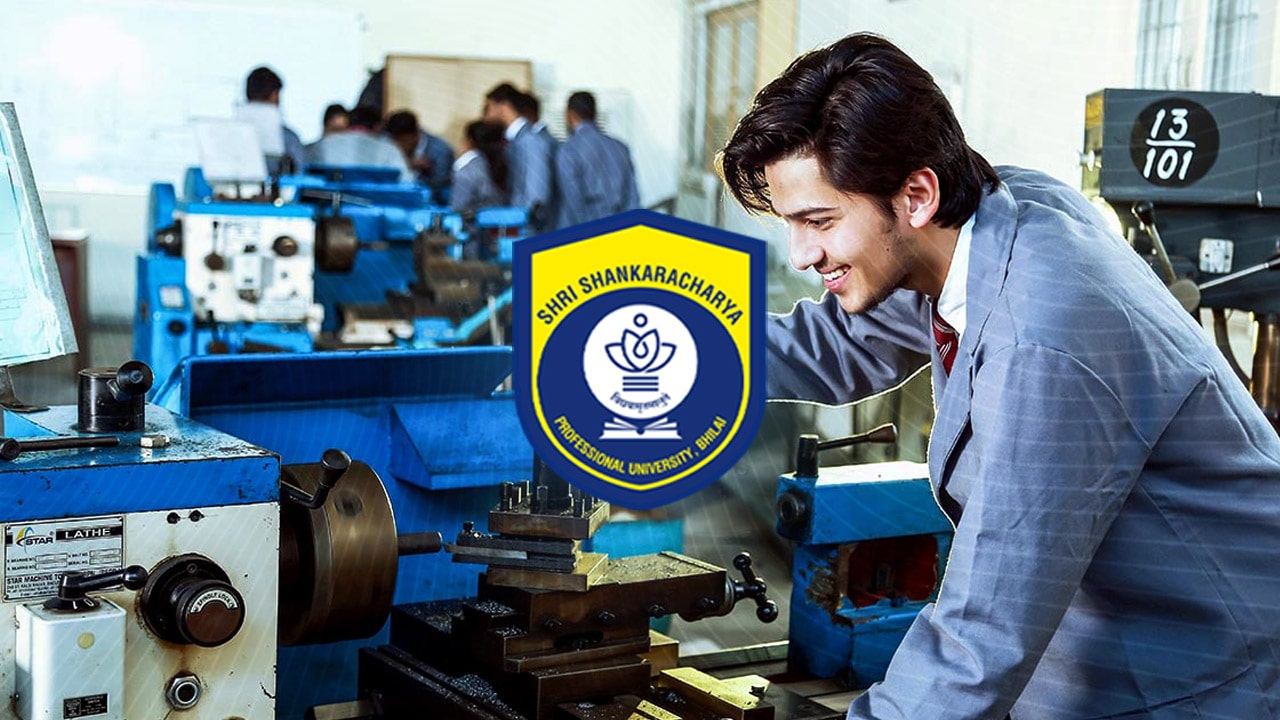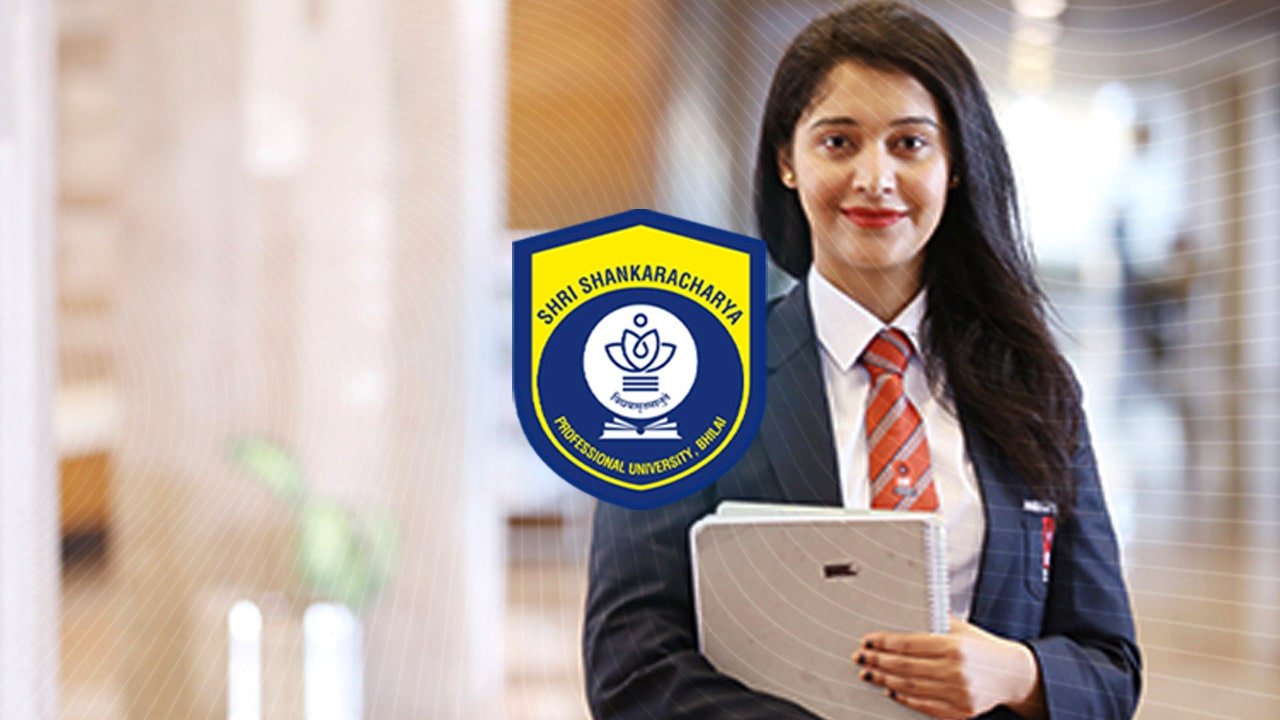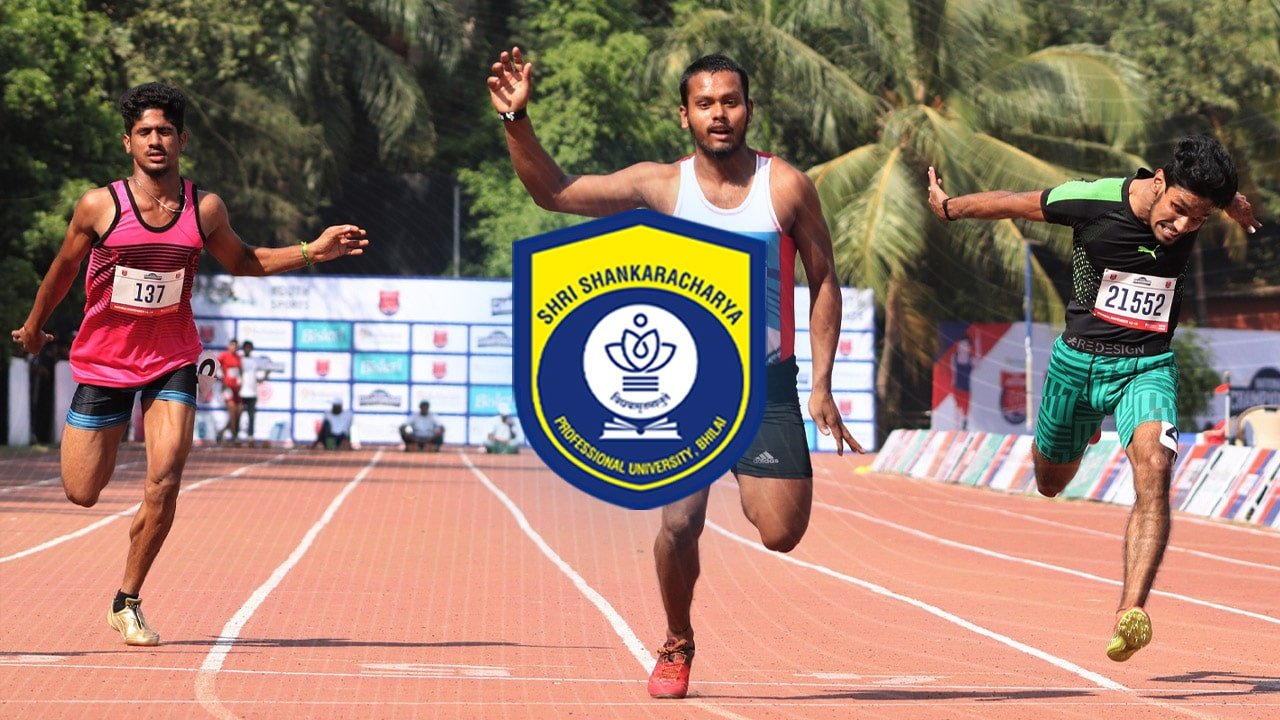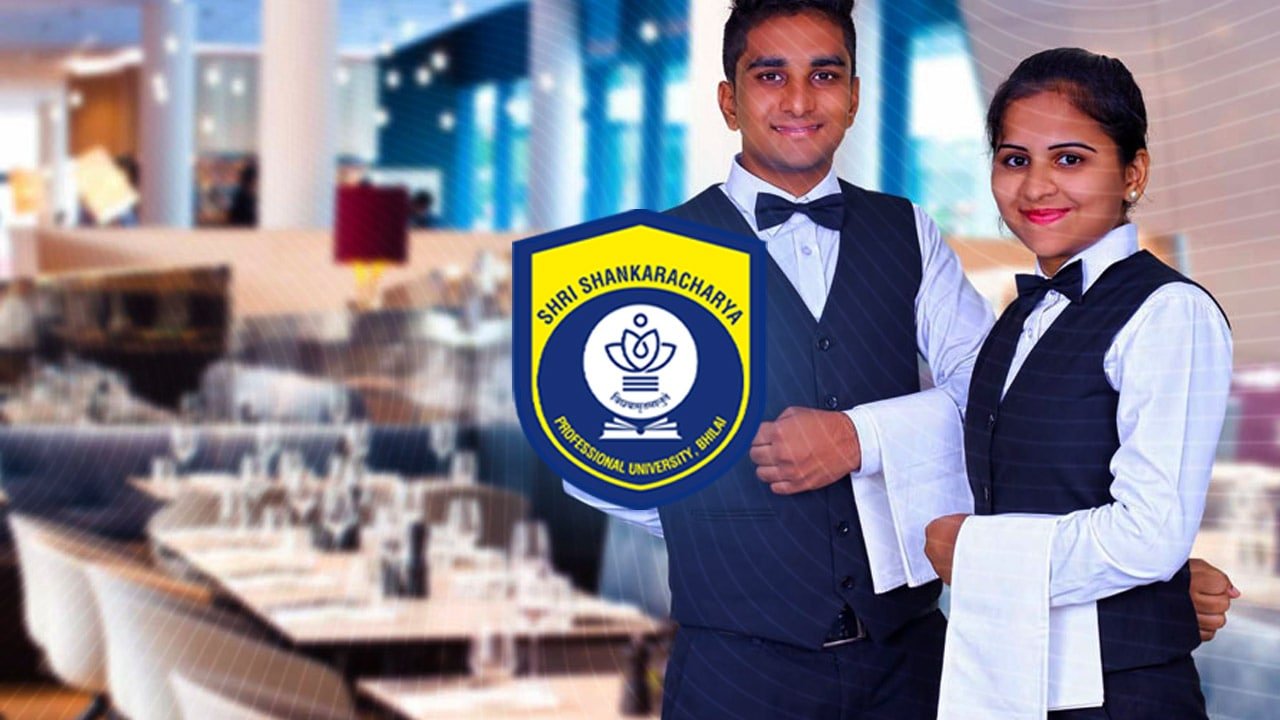Shri Shankaracharya Professional University
Assure your success with
our departments

School of Pharmacy
Department Overview
School of Pharmacy is “university teaching department” (UTD) of Shri Shankaracharya Professional University was founded in 2021 with the aim of nurturing skilled professionals in the realm of pharmaceutical sciences. Endowed with essential infrastructure and accreditation from the Pharmacy Council of India (PCI), the institute stands as a beacon of quality education in the field.
Shri Shankaracharya Professional University (SSPU) is the first university in India to be named after Adi-Shri Shankaracharya and blessed by all present Jagadgurus. This university was established on June 9, 2020, under the Chhattisgarh Private University (Establishment and Operation) Act, 2005 (No.13 of 2005) vide amendment Act 2020 (No. 12 of 2020) as Shri Shankaracharya Professional University (SSPU), Bhilai.
School of pharmacy UTD is the pioneer institute in the state of Chhattisgarh. The institute provides pharmacy courses such as D. Pharm. The institute has highly qualified faculty members with expertise in their respective areas. The faculty of the institute is actively involved in research activities. Institute proposed new B. Pharm. Courses from year 2024. B Pharma, also known as Bachelor of Pharmacy, is a 4-year UG degree in the field of Pharmacy. B Pharmacy focuses on various aspects of pharmaceutical sciences, including pharmacology, medicinal chemistry, pharmaceutical analysis, pharmacognosy, pharmaceutics, and pharmacy practice. Graduates of the B Pharma course are equipped with the knowledge and skills necessary to work in various sectors of the pharmaceutical industry, such as research and development, manufacturing, quality control, regulatory affairs, clinical pharmacy, and community pharmacy.
Vision
"To become a Centre of Excellence of Pharmacy Education and Research and to serve the society by developing in students heightened intellectual, cultural, ethical, and humane sensitivities; to foster a scientific temper and to promote professional and technological expertise.
Mission
The mission of the Institute, as described, encapsulates its aspirations to foster leadership, advance scientific knowledge, improve pharmacy practice, and contribute to economic development. By educating students to provide optimal pharmaceutical care, conducting vital research, and offering supportive services to patients and the community, the Institute is fulfilling a crucial role in shaping the future of pharmacy and healthcare.
Principal Desk
Welcome to the School of Pharmacy at Shri Shankaracharya Professional University (SSPU), Bhilai! Established in 2021, we are dedicated to shaping the future of pharmaceutical education through academic excellence, innovative research, and a culture of innovation.
As a proud University Teaching Department (UTD) of SSPU—the first university in India named after Adi-Shri Shankaracharya—we are deeply rooted in a rich heritage that inspires us to cultivate values, ethics, and a relentless pursuit of knowledge. Our PCI-accredited programs, including D. Pharm and B. Pharm, are designed to prepare students for thriving careers in R&D, manufacturing, regulatory affairs, and beyond.
Additionally, our collaborations with leading universities, research institutes, hospitals, and pharmaceutical industries provide students with invaluable practical exposure through internships, training programs, and industrial visits. As we continue to grow, our focus remains on empowering students to achieve their aspirations, whether in higher education, entrepreneurship, or impactful careers in the pharmaceutical field.
Warm regards,
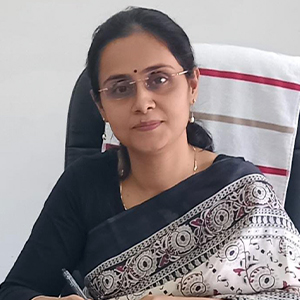
Dr. Gunjan Jeswani
Principal,
School of Pharmacy, Shri Shankaracharya Professional University
Academic Programs
| S.No. | Courses | Intake |
|---|---|---|
| 1 | Bachelor in Pharmacy [B.Pharm] | 100 |
| 2 | Diploma in Pharmacy [D.Pharm] | 60 |
Detailed Descriptions
| Programme | Duration | Mode | Eligibility | Tuition Fees |
|---|---|---|---|---|
| Diploma in Pharmacy [D.Pharm] | 2 years | Yearly | 10 + 2 or equivalent | Rs. 57,000/- per year |
| Bachelor of Pharmacy [B.Pharm] | 4 years | Semester | 10 + 2 or equivalent | Rs. 37,000/- per semester |
Key Achievements and Milestone
Faculty Achievements
- More than 10 research articles published in national and international journals.
- More than 7 patents published in Indian Patent Office.
Students Achievements
- Several Students actively participate in Pharmacist Day celebrations, annual function and fresher party.
Institute Highlight
- Established in 2021, delivering quality pharmacy education and healthcare expertise.
- Recognized by the Pharmacy Council of India (PCI), New Delhi.
- University Teaching Department (UTD) of SSPU, Bhilai.
- Comprehensive Curriculum integrating core pharmacy subjects with advanced research opportunities.
- Distinguished Faculty driving innovation.
- Digital Learning Tools: Smart classrooms and e-library access.
- Wi-Fi Enabled Campus for seamless connectivity.
- 17 Research Papers Published by Principal and Faculty.
- MoUs with pharmaceutical industries for internships and placements.
- Annual Pharmacy Fest: Competitions and seminars.
- Placement Support and dedicated career guidance programs.
- State-of-the-Art Library with journals and databases.
- Community Pharmacy Projects: Health camps and free medication distribution.
- Pharmaceutical Patent Cell: Facilitating patent filing.
- Student Exchange Programs with partner institutions.
- Industrial Visits for real-world exposure.
Faculty Profile
| S.N | Name | Designation |
|---|---|---|
| 1 | Dr. Gunjan Jeswani | Prof. & Principal |
| 2 | Mr. Ashish Kumar Pandey | Assoc. Professor & Head |
| 3 | Mr. Sunil Chandrakar | Assoc. Professor |
| 4 | Mr. Neeraj Kumar | Asst. Professor |
| 5 | Mr. Dorendra Kumar | Asst. Professor |
| 6 | Miss Poonam Naik | Asst. Professor |
| 7 | Miss Rishita Pathak | Asst Professor |
| 8 | Miss Nisar Anjum | Asst Professor |
| 9 | Miss Ruchi Nayak | Asst Professor |
| 10 | Mr. Shadab Ali | Asst. Professor |
| 11 | Mr. Amulya Sharma | Asst. Professor |
| 12 | Mr. Bholenath Sahu | Asst. Professor |
| 13 | Miss Sushmita Padhi | Asst. Professor |
| 14 | Miss Monika Ray | Asst. Professor |
| 15 | Jolly Rani Dhar | Asst. Professor |
| 16 | Mr. Vinay Kumar Nirmalkar | Asst. Professor |
| 17 | Mr. Subhash Kumar Sahu | Asst. Professor |
| 18 | Mr. Bhagya Pratap Royal | Asst. Professor |
Publication Metrics
Patents
- Indian patent granted to Dr. Gunjan Jeswani
- Novel Drug Delivery system of Amfenac Sodium. Patent No. 515332 (26 Feb 2024)
- Paclitaxel loaded aerosol nanoparticles. RSA Patent 2024/01108 (30 Oct 2024)
- Smart ID Card of employees monitoring vital signs. Indian Design No. 436070-001 (11 Dec 2024)
- Device for Particle Size Estimation of Nano Formulations. Indian Design No. 441934-001 (25 Dec 2024)
- AI Assisted Device for Prediction of Breast Cancer. Indian Design No. 442936-001 (03 Jan 2025)
- Micro Infusion Pump for Pancreatic Cancer. UK Design No. 6419154 (29 Jan 2025)
- Indian patents granted to Mr. Ashish Kumar Pandey
- Halymenia Porphyroides based biosynthesis nanoparticle composition for diabetes
- Vaccine for leptospirosis and preparation method
- Fast dissolving oral composition of etodolac
- Herbal Composition with antimalarial activity
- German patent to Mr. Neeraj Deshmukh
- 4-fluoro-2-cyanopyrrolidine derivative
- UK patent to Mr. Bholenath Sahu
- AI-enabled device for virtual screening of ultra-large chemical libraries
- Indian patent to Ms. Poonam Naik
- Design to AEROSOL FILLING MACHINE
Review Papers
Dr. Gunjan Jeswani
- Advances in the delivery of cancer therapeutics: a comprehensive review. Current Drug Delivery.
- Nanocosmetics: Past, present and future trends. Recent Patents on Nanomedicine.
- Recent approaches for reducing hemolytic activity of chemotherapeutic agents. Journal of Controlled Release.
Mr. Ashish Kumar Pandey
- Chemo-antidandruff agents. Research J. Topical and Cosmetic Sci.
- Molecular Docking study in polymer drug conjugates. Der Pharma Chemica.
- Electrolytes effervescent tablets – A review. J Cardiovasc. Dis. Res. Vol 12, Issue 03, 2021.
Mr. Neeraj Kumar
- Molecular docking for pegylated anti-inflammatory drug delivery.
Ms. Poonam Naik
- PEGylated micelles for targeted drug delivery: challenges and future directions.
Mr. Dorendra Deshmukh
- Nanoparticle delivery system and testicular morphology: the role of stereology.
D. Pharm Ordinance and Syllabus
Rules & Regulation B. Pharm.
Standard Inspection Form 2025 G2

School of Arts & Social Sciences
| S.NO | Programme Name | Course Duration | Eligibility |
|---|---|---|---|
| 1 | Bachelor of Library and Information Science (B.Lib.I.Sc.) | 1 Year | Graduate in any discipline from a recognized University or equivalent. |
| 2 | Master of Library and Information Science (M.Lib.I.Sc.) | 1 Year | B.Lib.I.Sc./B.Lib.Sc. from a recognized University or equivalent. |
| 3 | Bachelor of Arts (B.A.) | 3 Years | Higher Secondary (10+2) examination in any discipline from a recognized Board of Secondary Education or Equivalent. |
| 4 | Bachelor of Arts (Honours) (B.A.-Honours) | 3 Years | Higher Secondary (10+2) examination in any discipline from a recognized Board of Secondary Education. |
| 5 | Master of Arts (M.A.) | 2 Years | Any Graduate from a recognized University or equivalent. |
| 6 | Bachelor of Social Work (B.S.W.) | 3 Years | Higher Secondary (10+2) examination in any discipline from a recognized Board of Secondary Education or equivalent. |
| 7 | Master of Social Work (M.S.W.) | 2 Years | Any Graduate from a recognized University or preference will be given to candidate who is having B.S.W Degree. |
| 8 | Bachelor of Journalism (B.J.) | 1 Year | Graduate in any discipline from a recognized University or equivalent. |
| 9 | Master of Journalism (M.J.) | 1 Year | One Year BJ Programme after graduation from a recognized university or equivalent. |
| 10 | Bachelor of Arts in Journalism and Mass Communication (B.A.J.M.C) | 3 Years | Higher Secondary (10+2) examination in any discipline from a recognized Board of Secondary Education. |
| 11 | Master of Arts in Journalism and Mass Communication (M.A.J.M.C) | 2 Years | Graduation in Science or Medical science with relevant/allied subjects from a recognized University or equivalent. |
Department of Journalism and Mass Communication
| S.N. | Name of the Faculty | Qualification | Designation | Department |
|---|---|---|---|---|
| 1 | Dr. Dhanesh Joshi | Ph.D. in Mass Communication | Associate Professor | Journalism and Mass Communication |
| 2 | Dr. Sanjeev Kumar | Ph.D. in Journalism and Mass Communication | Assistant Professor | Journalism and Mass Communication |
| 3 | Dr. Naresh Kumar Sahu | Ph.D. in Mass Communication | Assistant Professor | Journalism and Mass Communication |
| 4 | Dr. Santosh Mishra | Ph.D. in Journalism and Mass Communication | Assistant Professor | Journalism and Mass Communication |
| 5 | Dr. Irfana Fatima | Ph.D. in Journalism and Mass Communication | Assistant Professor | Journalism and Mass Communication |
| 6 | Dr. Santosh Kumar | Ph.D. in Journalism and Mass Communication | Assistant Professor | Journalism and Mass Communication |
Department of English
| S.N. | Name of the Faculty | Qualification | Designation | Department |
|---|---|---|---|---|
| 1 | Dr. Neeta Pandey | Ph.D. (English) | Associate Professor | English |
| 2 | Mrs. Rashmi Agrahari | B.Sc (Bio), M.A. English | Assistant Professor | English |
| 3 | Dr. Sindhu Nair | M.A. English, M.Ed, Ph.D. | Assistant Professor | English |
Department of Sociology
| S.N. | Name of the Faculty | Qualification | Designation |
|---|---|---|---|
| 1 | Dr. Sneh Kumar Meshram | Ph.D., NET | Assistant Professor |
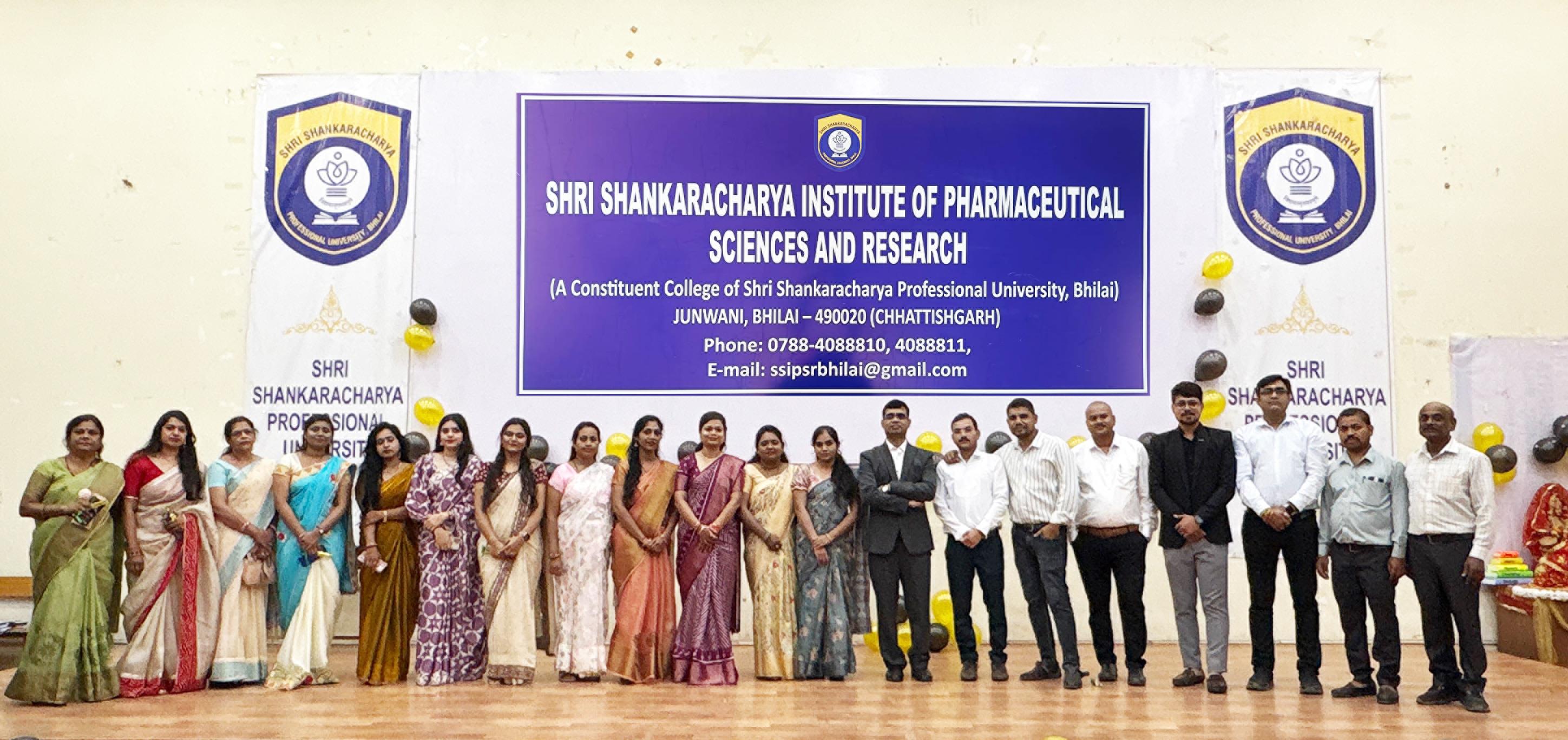
Shri Shankaracharya Institute of Pharmaceutical Sciences & Research
Shri Shankaracharya Institute of Pharmaceutical Sciences and Research (SSIPSR) was established in 2019 and since its first step, it continued to remain one of the best Pharmacy colleges in Bhilai, Chhattisgarh. The institute is approved by the Pharmacy Council of India (PCI). It is a Constituent college under Shri Shankaracharya Professional University (SSPU), Bhilai.
SIPSR has large numbers of highly qualified faculty members to deliver curriculum that aims at development of courses and programs based on both academic and industrial inputs. Every year, the institute witnessed large numbers of merit holders in M. Pharmacy, B Pharmacy and D Pharmacy
Institute Highlights
-
Established in 2019
-
Approved by Pharmacy Council of India (PCI), New Delhi
-
Constituent college under Shri Shankaracharya Professional University (SSPU), Bhilai.
-
Qualified Faculties
-
Digital Classrooms
-
Enlightening and Enriching Academic Ambience
-
Equipped Laboratory and Library
-
Wi-Fi Campus
-
Hi-Tech Audio-Visual Section
-
Top notch placements
-
More than 30 Indian and International patents published and granted
-
Hospital internship facility
-
Industrial training and visit programs
-
MOU sign with Shri Vile Parle Kelavani Mandal Institute of Pharmacy, Dhule
Director's Desk
Dear students, I Joy fully welcome you to the INNOVATIVE FAMILY, to learn and explore the profession of PHARMACY, which is noble in its character and pious in its deeds. “Quality of human life” is based on two pillars health and wealth, Healthcare system of any country plays a key role in the improvement of the quality of life of society. Pharmacists as an integral part of the health care system. It is an important link between patients, medicine, and physician, He is an expert in reading and understanding the prescription of drugs their doses, side effects, adverse effects, and counter-reactions with other medications, without a pharmacist the health system cannot be run smoothly. Our aim at imparting quality pharmacy education and programs to our students and forging the youth into a formidable force to cater to the need of the nation’s Health for All”.
Along with the regular syllabus prescribed by the University, our highly qualified, experienced, and devoted staff trains the students not only to excel in academics but also in other activities. Our academic program also encompasses a series of guest lectures, industrial visits, and workshops from professionals in the Pharmaceutical Industry, who keep our students updated with the current technologies and enlighten them about the various avenues in the pharmaceutical industry thus preparing them for the corporate world of Pharmaceuticals. I hope you will be one of those fortunate students who get admission to our college and I assure you that, your life in this college will be academically fruitful and pleasant.

Dr. Hemant Ramchandra Badwaik
M. Pharma., Ph.D.
Director, SSIPSR, Bhilai
E-mail: hemantrbadwaik@gmail.com | hemantbadwaik@rediffmail.com
Message from Director
Dear students,
I Joy fully welcome you to the INNOVATIVE FAMILY, to learn and explore the profession of PHARMACY, which is noble in its character and pious in its deeds. “Quality of human life” is based on two pillars health and wealth, Healthcare system of any country plays a key role in the improvement of the quality of life of society. Pharmacists as an integral part of the health care system. It is an important link between patients, medicine, and physician, He is an expert in reading and understanding the prescription of drugs their doses, side effects, adverse effects, and counter-reactions with other medications, without a pharmacist the health system cannot be run smoothly. Our aim at imparting quality pharmacy education and programs to our students and forging the youth into a formidable force to cater to the need of the nation’s Health for All”.
Along with the regular syllabus prescribed by the University, our highly qualified, experienced, and devoted staff trains the students not only to excel in academics but also in other activities. Our academic program also encompasses a series of guest lectures, industrial visits, and workshops from professionals in the Pharmaceutical Industry, who keep our students updated with the current technologies and enlighten them about the various avenues in the pharmaceutical industry thus preparing them for the corporate world of Pharmaceuticals. I hope you will be one of those fortunate students who get admission to our college and I assure you that, your life in this college will be academically fruitful and pleasant.
Dr. Hemant Ramchandra Badwaik
M. Pharma., Ph.D.
Director, SSIPSR, Bhilai
PROGRAMMES OFFERED
List of Undergraduate, Graduate, Postgraduate programs & Research Course
| Programme | Duration | Mode | Eligibility |
|---|---|---|---|
| Diploma in Pharmacy [D.Pharm] | 2 years | Yearly | 10 + 2 or equivalent |
| Bachelor of Pharmacy [B.Pharm] | 4 years | Semester | 10 + 2 or equivalent |
| Master of Pharmacy [Pharmaceutical Chemistry] | 2 years | Semester | B. Pharm pass out with or without GPAT |
| Ph.D. in Pharmaceutical sciences | - | - | As per UGC norms |
|
|
Faculty List
| Sr. No | Name of the Employee | Designation | Qualification |
|---|---|---|---|
| Department of Pharmaceutical Chemistry | |||
| 1 | Dr. Hemant R. Badwaik | Professor & Principal | M. Pharm, PhD |
| 2 | Dr. Alok Singh Thakur | Professor | M. Pharm, PhD |
| 3 | Dr. Sagar M. Agnihotri | Professor | M. Pharm, PhD |
| 4 | Dr. Laxmi | Professor | M. Pharm, PhD |
| 5 | Ms. Lokkanya Dewangan | Assistant Professor | M. Pharm |
| 6 | Ms. Alka Verma | Assistant Professor | M. Pharm |
| 7 | Ms. Ranjeeta Kumari | Assistant Professor | M. Pharm |
| 8 | Ms. Noor Afrin | Assistant Professor | M. Pharm |
| 9 | Mr. Rakesh Kumar Naik | Assistant Professor | M. Pharm |
| 10 | Mrs. Rita Channa | Assistant Professor | M. Pharm |
| 11 | Mr. Deepak Yadav | Assistant Professor | M. Pharm |
| 12 | Ms. Rekha Jaiswal | Assistant Professor | M. Pharm |
| Department of Pharmacology | |||
| 13 | Mr. Lokesh Kumar | Associate Professor | M. Pharm |
| 14 | Mr. Dhanush Ram | Associate Professor | M. Pharm |
| 15 | Mr. Ashutosh Patankar | Assistant Professor | M. Pharm |
| 16 | Mr. Rashmi Suryavanshi | Assistant Professor | M. Pharm |
| 17 | Ms. Vicky Soni | Assistant Professor | M. Pharm |
| Department of Pharmaceutics | |||
| 18 | Mrs. Sheetal Mishra | Associate Professor | M. Pharm |
| 19 | Mrs. Pali Khobragade | Associate Professor | M. Pharm |
| 20 | Mr. Narendra Kumar | Associate Professor | M. Pharm |
| 21 | Mr. Sachin Gupta | Assistant Professor | M. Pharm |
| 22 | Mrs. Sunita Singh | Assistant Professor | M. Pharm |
| 23 | Mr. Durgesh Verma | Assistant Professor | M. Pharm |
| 24 | Mr. Vinayak Verma | Assistant Professor | M. Pharm |
| 25 | Mr. Hemlata Thapa | Assistant Professor | M. Pharm |
| 26 | Mr. Tushar Verma | Assistant Professor | M. Pharm |
| 27 | Mr. Kulesh Kumar Ghirwani | Assistant Professor | M. Pharm |
| 28 | Ms. Preeti Verma | Assistant Professor | M. Pharm |
| Department of Pharmacognosy | |||
| 29 | Mr. Veena Chandrakar | Assistant Professor | M. Pharm |
| 30 | Ms. Prachi Agrawal | Assistant Professor | M. Pharm |
| 31 | Mr. Abhishek Soni | Assistant Professor | M. Pharm |
| 32 | Ms. Sonali Meshram | Assistant Professor | M. Pharm |
| 33 | Ms. Monika Chandrakar | Assistant Professor | M. Pharm |
| 34 | Mr. Rakesh Rajput | Assistant Professor | M. Pharm |
SIF Report 2026-27
Syllabus of B.Pharma, M.Pharma & D.Pharma
Events Organised
SSIPSR has been organizing various events throughout the year to enhance the learning experience of students and to promote cultural and social activities. Here is a list of some of the key events organized by SSIPSR:
COMMITTEE
Students Grievances Redressal Committee(s) (SGRC)
| SN | Name of Members | Designation | Contact Details | ||
|---|---|---|---|---|---|
| 1 | Dr. Hemant R. Badwaik | Chairperson | 7879059209 | hemantrbadwaik@gmail.com | |
| 2 | Dr. Alok Singh Thakur | Members | 9752097870 | aloksinghthakur19852@gmail.com | |
| 3 | Dr. Laxmi | Members | 8871958122 | banjare.laxmi2@gmail.com | |
| 4 | Dhanush Ram | Members | 7987330213 | turkanedhanushram@gmail.com | |
| 5 |
|
Members | 9479280362 | Vtushar464@gmail.com | |
| 6 | Ms. Neha Mishra | Students Representative | 7247428629 | nehamisha13y@gmail.com |
Women Grievances Cell
| SN | Name of Members | Designation | Contact Details | |
|---|---|---|---|---|
| 1 | Dr. Hemant R. Badwaik | Chairperson | 7879059209 | hemantrbadwaik@gmail.com |
| 2 | Dr. Laxmi | Member | 8871958122 | banjare.laxmi2@gmail.com |
| 3 | Mrs. Pali Khobragade | Member | 8103631565 | khobragadepali@gmail.com |
| 4 | Mrs. Sunita Singh | Members | 9165626266 | sunitapharma266@gmail.com |
| 5 | Mrs. Sheetal Mishra | Member | 8839405053 | sm.sheetalmishra@gmail.com |
| 6 | Ms. Heena Verma | Student | 6266483441 | vheena602@gmail.com |
| 7 | Ms. Yashika Sharma | Student Representative | 7415515155 | yashikasharma566@gmail.com |
| 8 | Ms. Aanchal Dey | Student | 9039205720 | aanchaldey30@gmail.com |
Anti Ragging- Cell
| SN | Name of Members | Designation | Contact Details | |
|---|---|---|---|---|
| 1 | Dr. Hemant R. Bawaik | Chairman | 7879059209 | hemantrbadwaik@gmail.com |
| 2 | Dr. Alok singh Thakur | Member(Professor Incharge) | 9752097870 | aloksinghthakur19852@gmail.com |
| 3 | Ms. Alka Verma | Member | 7389422282 | alkaakverma@gmail.com |
| 4 | Mrs. Sheetal Mishra | Member | 8839405053 | sm.sheetalmishra@gmail.com |
| 5 | Mrs. Sunita Singh | Member | 9165626266 | sunitapharma266@gmail.com |
| 6 | Mr. Gulshan | Member (Student) | 6264411655 | gv06042002@gmail.com |
Anti-Ragging Squad
| SN | Name of Members | Designation | Contact Details | |
|---|---|---|---|---|
| 1 | Mr. Lokesh Kumar | Asso. Professor | 9340653382 | lokesh.pcology@gmail.com |
| 2 | Mr Ashutosh Patankar | Asst. Professor | 9098160783 | patankarashutosh468@gmail.com |
| 3 | Mr. Sachin Gupta | Asst. Professor | 8871629276 | sachingupta55577@gmail.com |
| 4 | Mrs. Sheetal Mishra | Member | 8839405053 | sm.sheetalmishra@gmail.com |
| 5 | Mrs. Sunita Singh | Member | 9165626266 | sunitapharma266@gmail.com |
| 6 | Mrs. Vandana Mishra | Store Incharge | 7974135510 | vandanamishra@gmail.com |
Anti- Discrimination Cell
| SN | Name of Members | Designation | Contact Details | |
|---|---|---|---|---|
| 1 | Dr. Hemant R. Badwaik | Chairman | 7879059209 | hemantrbadwaik@gmail.com |
| 2 | Mr. Lokesh Kumar | Asso. Professor | 9340653382 | lokesh.pcology@gmail.com |
| 3 | Mr. Anita Rajput | Lab Assistant | 8269657099 | anitarajput01011992@gmail.com |
| 3 | Ms. Lokkanya Dewangan | Asst. Professor | 9340036145 | lokkanyadewangan@gmail.com |
| 4 | Ms. Tushar Verma | Asst. Professor | 9479280362 | vtushar464@gmail.com |
| 5 | Ms. Noor Afrin | Asst. Professor | 6269106680 | afrin27noor@gmail.com |
| 6 | Mrs. Vandana Mishra | Store In charge | 7974135510 | vandanamishra1152@gmail.com |
Gender Sensitization - Cell
| SN | Name of Members | Designation | Contact Details | |
|---|---|---|---|---|
| 1 | Dr. Hemant R. Badwaik | Chairman | 7879059209 | hemantrbadwaik@gmail.com |
| 2 | Mr. Lokesh Kumar | Professor Incharge | 8871958122 | lokesh.pcology@gmail.com |
| 3 | Mr. Narendra Kumar | Member | 8770192414 | narendrakumar.ch1789@gmail.com |
| 4 | Ms. Rashmi Suryawanshi | Member | 8319851652 | rinisuryavanshi.rs@gmail.com |
| 5 | Ms. Vicky Soni | Member | 7974135510 | vickysony2909@gmail.com |
| 6 | Ms. Alka Verma | Member | 7389422282 | alkaakverma@gmail.com |
| 7 | Ms. Sonali Chandarakar | Member | 6232010133 | sspusonali@gmail.com |
PUBLICATION METRICS
- More than 200 research articles are published in peer reviewed national and International Journals
- More than 70 research outcomes are presented in national and International Conferences.
- Eight Indian Patents Published and one International Patent Granted.
- In the year 2023-25: 50 publications, 10 Patents, 10 Book Chapters, and 15 Books published.
RESEARCH STATISTICS
Dr. Hemant Ramchandra Badwaik
- Five Indian Patents published and three International Patents granted.
- Eleven textbooks published by Elsevier, VallabhPrakashan, UnnatiPrakashan, PV, and PharmaMed Press.
- Sixteen book chapters published by Taylor & Francis, Elsevier, and Springer Nature.
- High-quality publications related to Microwave Chemistry, Polymer Chemistry, Medicinal Chemistry, and Novel Drug Delivery.
- More than 75 publications (Total Impact Factor: 170) in peer-reviewed national and international journals.
- Google Scholar citation: 9WaPm2cAAAAJ
- • Citation: 2691
- • h-index: 26 i10-index: 52
- Scopus citation: 42961006200
- • Citation: 1771
- • h-index: 23
Dr. Alok Singh Thakur
- Seven Indian patents published.
- High-quality publications related to Computer-Aided Drug Design, Synthetic Chemistry, Medicinal Chemistry, and Novel Drug Delivery.
- More than 35 publications (Total Impact Factor: 22) in peer-reviewed national and international journals.
- Three textbooks published by UnnatiPrakashan, Pee Vee Publications, and Lambert Publication.
- Google Scholar citation: dP5y2HcAAAAJ
- • Citation: 818
- • h-index: 14 i10-index: 15
- Scopus citation: 42961006200
- • Citation: 176
- • h-index: 6
Dr. Laxmi Banjare
- One Indian patent published.
- High-quality publications related to Computer-Aided Drug Design, Synthetic Chemistry, Medicinal Chemistry, and Novel Drug Delivery.
- More than 24 publications in peer-reviewed national and international journals.
- Google Scholar citation: Bc238jAAAAAJ
- • Citation: 287
- • h-index: 10 i10-index: 10
- Scopus citation: 57210573450
- • Citation: 166
- • h-index: 8
Mr. Dhanush Ram Turkane
- Two Indian formulation and Two UK design patent published.
- High-quality publications related to Antibiotics, Pharmacology, Pharmacognosy and Pharmaceutics.
- Nine publications in peer-reviewed national Journals.
- One Scopus publications in International Journals.
- One conference proceeding publications in International Journals.
- One book chapters published by Nexus Knowledge publication
- Google Scholar citation: 2aaTl2AAAAAJ&hl=en
- • Citation: 72
- • h-index: 4 i10-index: 2
Achievements
Faculty Achievements
- Dr. Hemant R Badwaik is selected for top 2% scientist list published by Stanford University in 2025.
- More than 200 research articles are published in national and international journals.
- More than 25 books and 14 book chapters are published by national and international publishers
- More than 116 research outcomes are presented in national and international conferences
- More than 30 patents are published in Indian patent office and one International Patent Granted.
- More than 70 research outcomes are presented in national and International Conferences.
- In the year 2023-25: 50 publications, 10 Patents, 10 Book Chapters, and 15 Books published.
Students Achievements
|
Topper List 2024 - 25 session |
|||||
|
APR – MAY 2025 |
|||||
|
SN |
Branch |
Class |
Name of Students |
Roll No |
% |
|
1 |
M. Pharm |
4 Sem |
Bhumika Verma |
232406065002 |
83 % |
|
2 |
M. Pharm |
2 Sem |
Priyanka Dewangan |
2425002086005 |
85 % |
|
3 |
B. Pharm |
8 Sem |
Khushboo Bhaskar |
312104121009 |
82 % |
|
4 |
B. Pharm |
6 Sem |
Yashika Sharma |
222302061045 |
88 % |
|
5 |
B. Pharm |
4 Sem |
Aanchal Dey |
232402061001 |
91 % |
|
6 |
B. Pharm |
2 Sem |
Afrin Begum |
242502061001 |
87 % |
|
7 |
D. Pharm |
2 Year |
Shruti Rajput |
232402062049 |
82 % |
|
8 |
D. Pharm |
1 Year |
Sameer Prajapati |
242502062049 |
88 % |
|
NOV- DEC 2025 |
|||||
|
SN |
Branch |
Class |
Name of Students |
Roll No |
% |
|
1 |
M. Pharm |
3 Sem |
Rakesh Kumar Naik |
232406065008 |
83 % |
|
2 |
M. Pharm |
1 Sem |
Priyanka Dewangan |
2425002086005 |
79 % |
|
3 |
B. Pharm |
7 Sem |
Khushboo Bhaskar |
312104121009 |
87 % |
|
4 |
B. Pharm |
5 Sem |
Yashika Sharma |
222302061045 |
85 % |
|
5 |
B. Pharm |
3 Sem |
Aanchal Dey |
232402061001 |
85 % |
|
6 |
B. Pharm |
1 Sem |
Y. Shreya |
242502061032 |
83 % |
- Rupendra Kumar Sahu and Gulshan Sahuand 7th Sem students got first prize in poster presentation at Columbia Institute of Pharmacy, Tekari, Raipur.
- Rupendra Kumar Sahu and S. Nandini 7th Sem students got first prize in poster presentation at Rawatpura Sarkar Institute in pharmacy, Kumhari, Durg.
- Fazila Firdous 3rd Sem student got first prize in oral presentation at Rawatpura Sarkar Institute in pharmacy, Kumhari, Durg.
- Divyanshu Tripathi got first prize in Pharma-Expo competition on Pharmacist Day
- Several Students actively participate in Nation Service Scheme (NSS).
Books published by
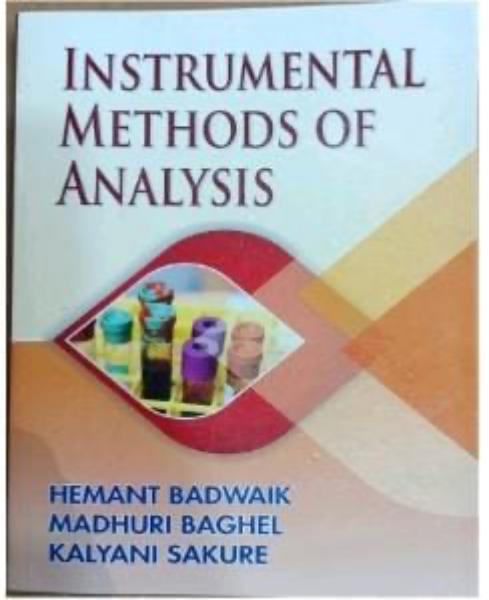
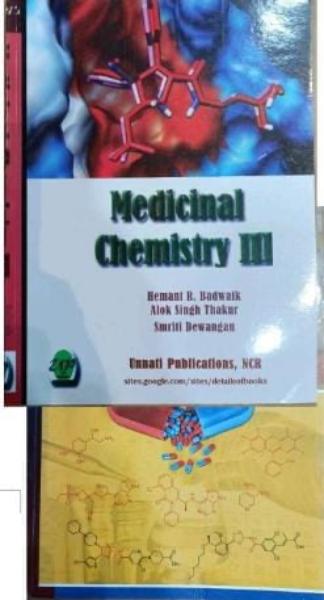
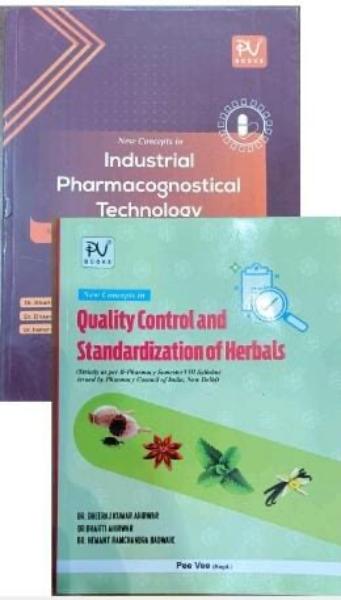
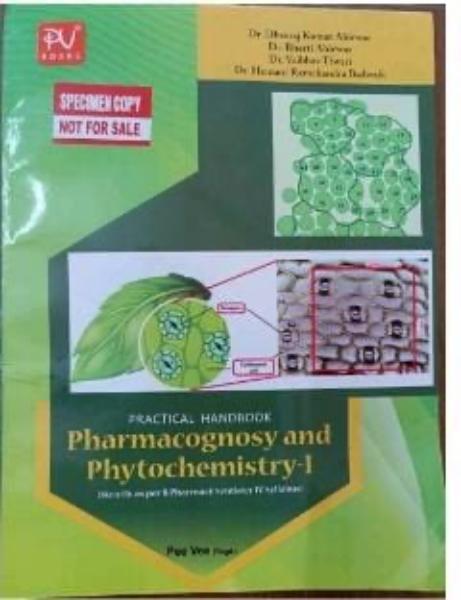
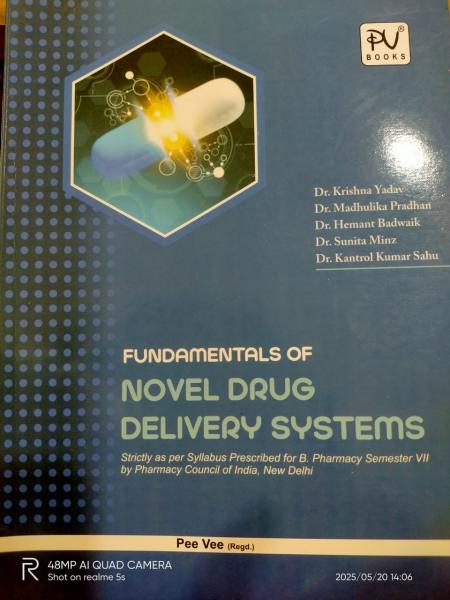
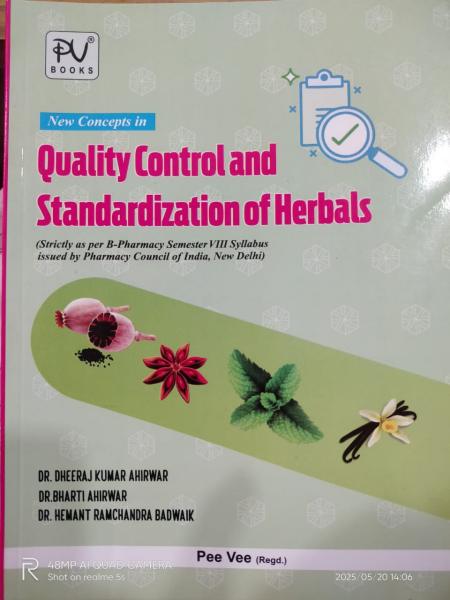
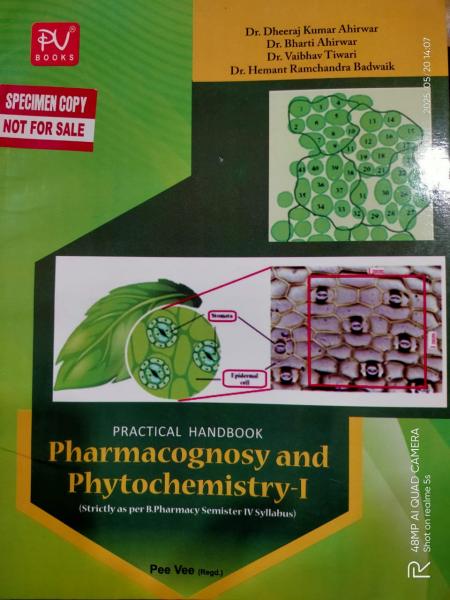
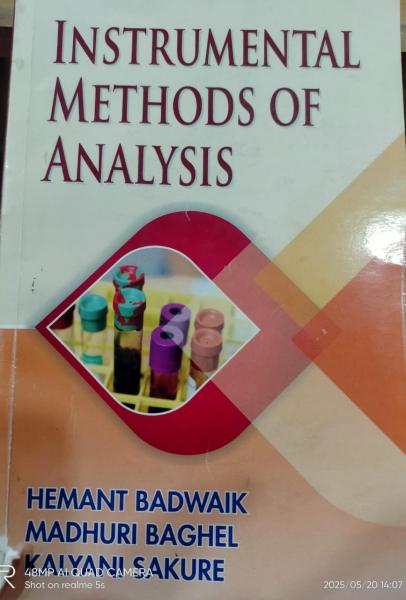

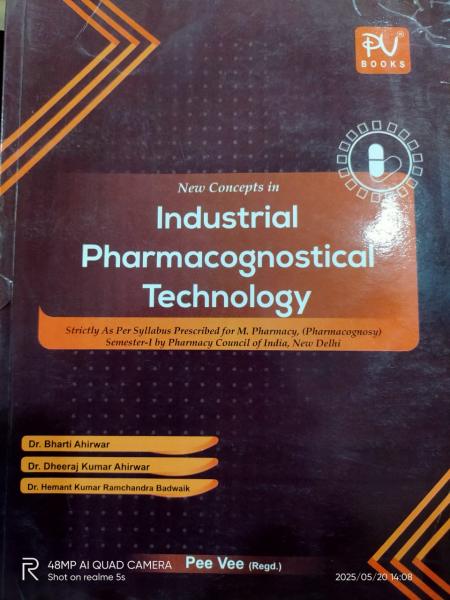
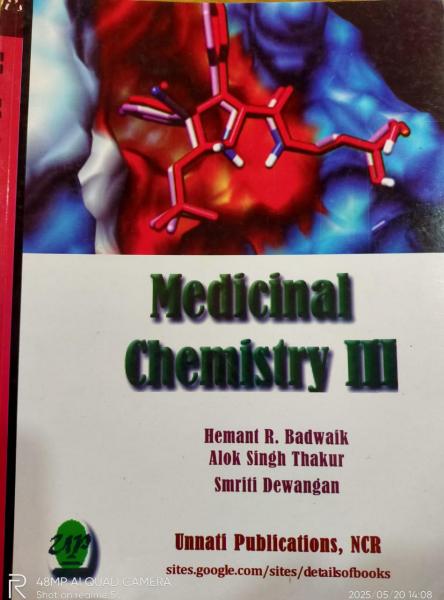
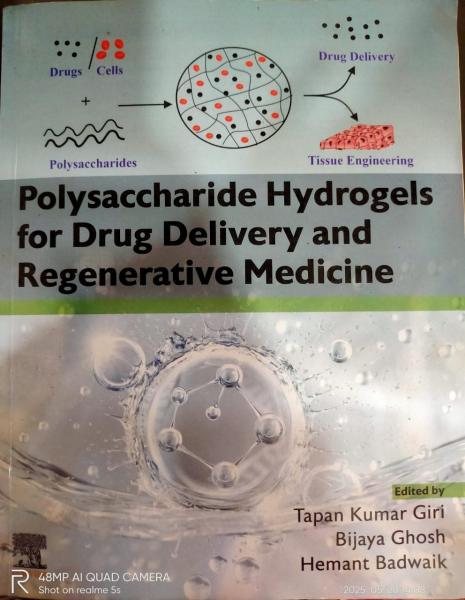
Facilities
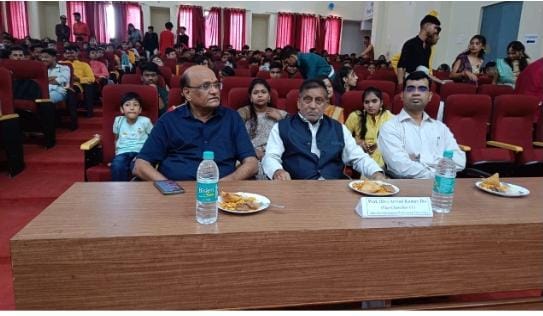
Auditorium Facility
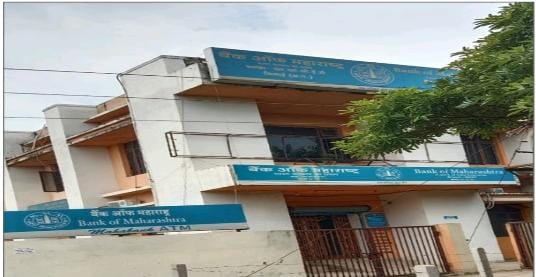
Bank of Maharashtra
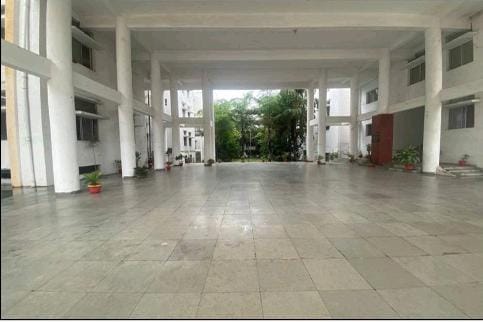
Campus
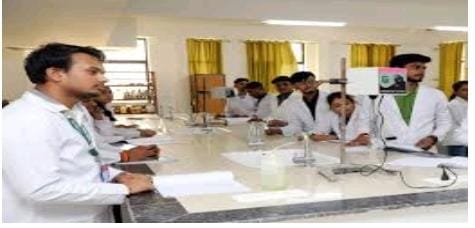
Laboratory Facility
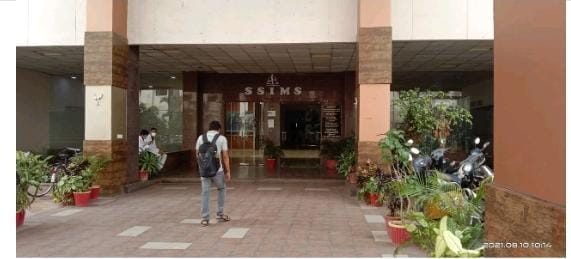
Medical Facility
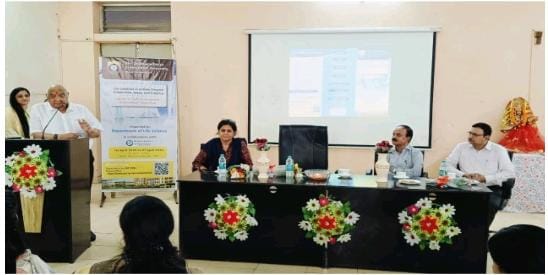
Seminar Hall Facility
RESULT ANALYSIS
APR-MAY 2023
|
S. NO. |
BATCH |
TOTAL ENROLLED |
ACTUALLY APPEARED |
PASSED STUDENTS % |
% FAIL STUDENTS |
|
1 |
M. PHARM 4TH SEM |
9/9 |
9 |
100% |
0% |
|
2 |
M. PHARM 2ND SEM |
15/15 |
15 |
100% |
0% |
|
3 |
B. PHARM 8TH SEM |
100 |
100 |
100 % |
0 % |
|
4 |
B. PHARM 6TH SEM |
44 |
44 |
95 % |
5 % |
|
5 |
B. PHARM 4RTH SEM |
92 |
92 |
76 % |
24 % |
|
6 |
B. PHARM 2ND SEM |
86 |
86 |
78 % |
22 % |
|
7 |
D. PHARM1ST YEAR |
60 |
60 |
98% |
2% |
|
8 |
D. PHARM2NDYEAR |
59 |
59 |
92 % |
8 % |
NOV-DEC 2023
|
S. NO. |
BATCH |
TOTAL ENROLLED |
ACTUALLY APPEARED |
PASSED STUDENTS % |
% FAILED STUDENTS |
|
1 |
M PHARM 3RD SEM |
9/9 |
9 |
100% |
0% |
|
2 |
M PHARM 1ST SEM |
15/15 |
15 |
100% |
0% |
|
3 |
B PHARM 7TH SEM |
100/100 |
100 |
99 % |
1 % |
|
4 |
B PHARM 5TH SEM |
44/100 |
44 |
93 % |
7 % |
|
5 |
B PHARM 3RD SEM |
95/100 |
95 |
72 % |
28 % |
|
6 |
B PHARM 1ST SEM |
90/100 |
90 |
60 % |
40 % |
STUDENTS ENROLLED AS 2024-25
|
Admission details category wise 2025-26 |
|||||||||||
|
Year |
Total |
Male |
Female |
ST |
SC |
OBC |
General |
||||
|
2025 Batch |
Students |
Male |
Female |
Male |
Female |
Male |
Female |
Male |
Female |
||
|
B. Pharma |
78 |
48 |
30 |
5 |
2 |
7 |
6 |
26 |
12 |
10 |
10 |
|
Diploma |
61 |
32 |
29 |
1 |
3 |
3 |
5 |
22 |
14 |
6 |
7 |
|
M. Pharma |
15 |
5 |
10 |
0 |
0 |
0 |
1 |
2 |
9 |
3 |
0 |
Placement Cell
Placement Cell: - The placement cell works as a bridge between the students and potential employers to provide career guidance, training, and placement services to the students.
|
SN |
Name of Members |
Designation |
Contact No |
|
|
1 |
Mr. Lokesh kumar |
TPO |
9340653382 |
lokesh.pcology@gmail.com |
|
2 |
Mr. Ashutosh Patankar |
Asst. Professor |
9098160783 |
patankarashutosh468@gmail.com |
|
3 |
Mrs. Sheetal Mishra |
Member |
8839405053 |
sm.sheetalmishra@gmail.com |
|
4 |
Mrs. Sunita Singh |
Member |
9165626266 |
sunitapharma266@gmail.com |
Career Guidance Cell / Placement Cell Data – 2023
|
SN |
Class |
Participant |
Industry |
MR |
Medical Shop |
Teaching |
Higher Studies |
|
1 |
D. Pharm |
60 |
2 |
4 |
10 |
00 |
2 |
|
2 |
B. Pharm |
50 |
7 |
7 |
7 |
00 |
15 |
|
3 |
M. Pharm |
12 |
0 |
0 |
0 |
5 |
0 |
LIST OF STUDENTS SELECTED IN CAMPUS 2023-24 SSIPSR
Campus Placement
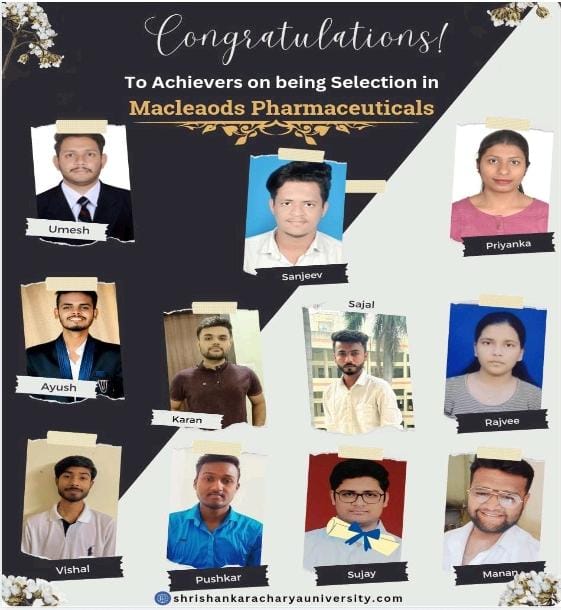
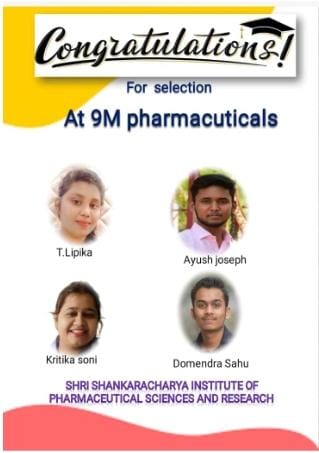
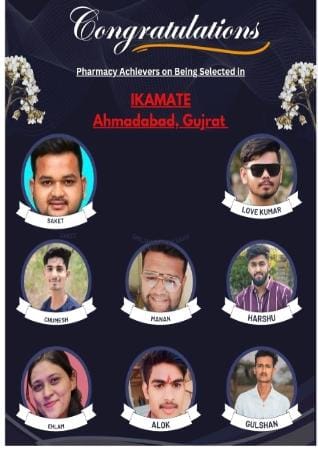
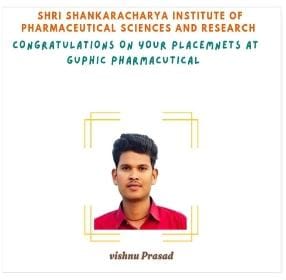
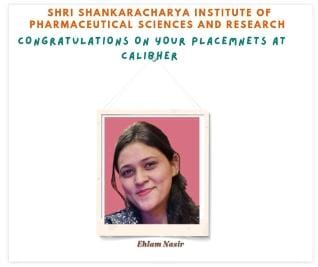
CARTEL PHARMACEUTICALS
| SN | NAME | CLASS | CONTACT NUMBER |
|---|---|---|---|
| 1 | T. Lipika | B.Pharm VIII sem | 8827891968 |
| 2 | Karan Choubey | B.Pharm VIII sem | 8319898819 |
| 3 | Alok Sahu | B.Pharm VIII sem | 9770738719 |
| 4 | Chumesh | B.Pharm VIII sem | 7722982965 |
9M PHARMACEUTICALS
| SN | NAME | CLASS | CONTACT NUMBER |
|---|---|---|---|
| 1 | T. Lipika | B.Pharm VIII sem | 8827891968 |
| 2 | Ayush Joseph | B.Pharm VIII sem | 7772835148 |
| 3 | Kritika Kumar Soni | B.Pharm VIII sem | 9301216521 |
| 4 | Domendra Kumar | B.Pharm VIII sem | 7440970364 |
MACLEODS PHARMACEUTICALS
| SN | NAME | CLASS | CONTACT NUMBER |
|---|---|---|---|
| 1 | Priyanka Dewanagan | B.Pharm VIII sem | 6263628960 |
| 2 | Rajvee Virulkar | B.Pharm VIII sem | 7000574448 |
| 3 | Manan Waghela | B.Pharm VIII sem | 8019787078 |
| 4 | Sujay Shukla | B.Pharm VIII sem | 9009681777 |
| 5 | Vishal Gupta | B.Pharm VIII sem | 9691603939 |
| 6 | Ayush Yadav | B.Pharm VIII sem | 6267514719 |
| 7 | Sajal Singh Gour | B.Pharm VIII sem | 9617717753 |
| 8 | Karan Choubey | B.Pharm VIII sem | 8319898819 |
| 9 | Umesh Chandra | B.Pharm VIII sem | 8109564933 |
| 10 | Pushkar Dewangan | B.Pharm VIII sem | 9981722962 |
| 11 | Sanjeev Patel | B.Pharm VIII sem | 7999683760 |
GENERAL DIAGNOSTIC
| SN | NAME | CLASS | CONTACT NUMBER |
|---|---|---|---|
| 1 | Vishnu Prasad | B.Pharm VIII sem | 6264821825 |
IKAMATE
| SN | NAME | CLASS | CONTACT NUMBER |
|---|---|---|---|
| 1 | Saket Singh Rajput | B.Pharm VIII sem | 8085324148 |
| 2 | Love Kumar Sahu | B.Pharm VIII sem | 8770590152 |
| 3 | Chumesh | B.Pharm VIII sem | 7722982965 |
| 4 | Manan Waghela | B.Pharm VIII sem | 8019787078 |
| 5 | Harsh | B.Pharm VIII sem | 6261326145 |
| 6 | Ehlam Nasir | B.Pharm VIII sem | 8827246508 |
| 7 | Alok Sahu | B.Pharm VIII sem | 9770738719 |
| 8 | Gulshan Patel | B.Pharm VIII sem | 7999067093 |
CALIBEHR
| SN | NAME | CLASS | CONTACT NUMBER |
|---|---|---|---|
| 1 | Ehlam Nasir | B.Pharm VIII sem | 8827246508 |
GUPHIC PHARMACEUTICALS
| SN | NAME | CLASS | CONTACT NUMBER |
|---|---|---|---|
| 1 | Vishnu Prasad | B.Pharm VIII sem | 6264821825 |
NEWS AND EVENTS
07th to 9th APRIL- The annual day celebration was held at SSIPSR. The event was a great success, showcasing the talents and achievements of our students and participants
National Service Scheme (NSS)
NSS:- The National Service Scheme (NSS) is a Central Sector Scheme of Government of India, Ministry of Youth Affairs & Sports. NSS is an extension dimension to the higher education system to orient the students youth to community service while they are studying in educational institutions.
NSS unit of SSIPSR has organized a awareness program on Adverse drug reaction day (Pharmacovigilance day). In this activity our chief guest was Mr. Harsh Deshmukh, Pharmacovigilance Associate, IPC, Ghaziabad and Mr. Dhanush Ram Turkane & Mr. Ashutosh Patankar, Assistant professor have coordinated the activity.

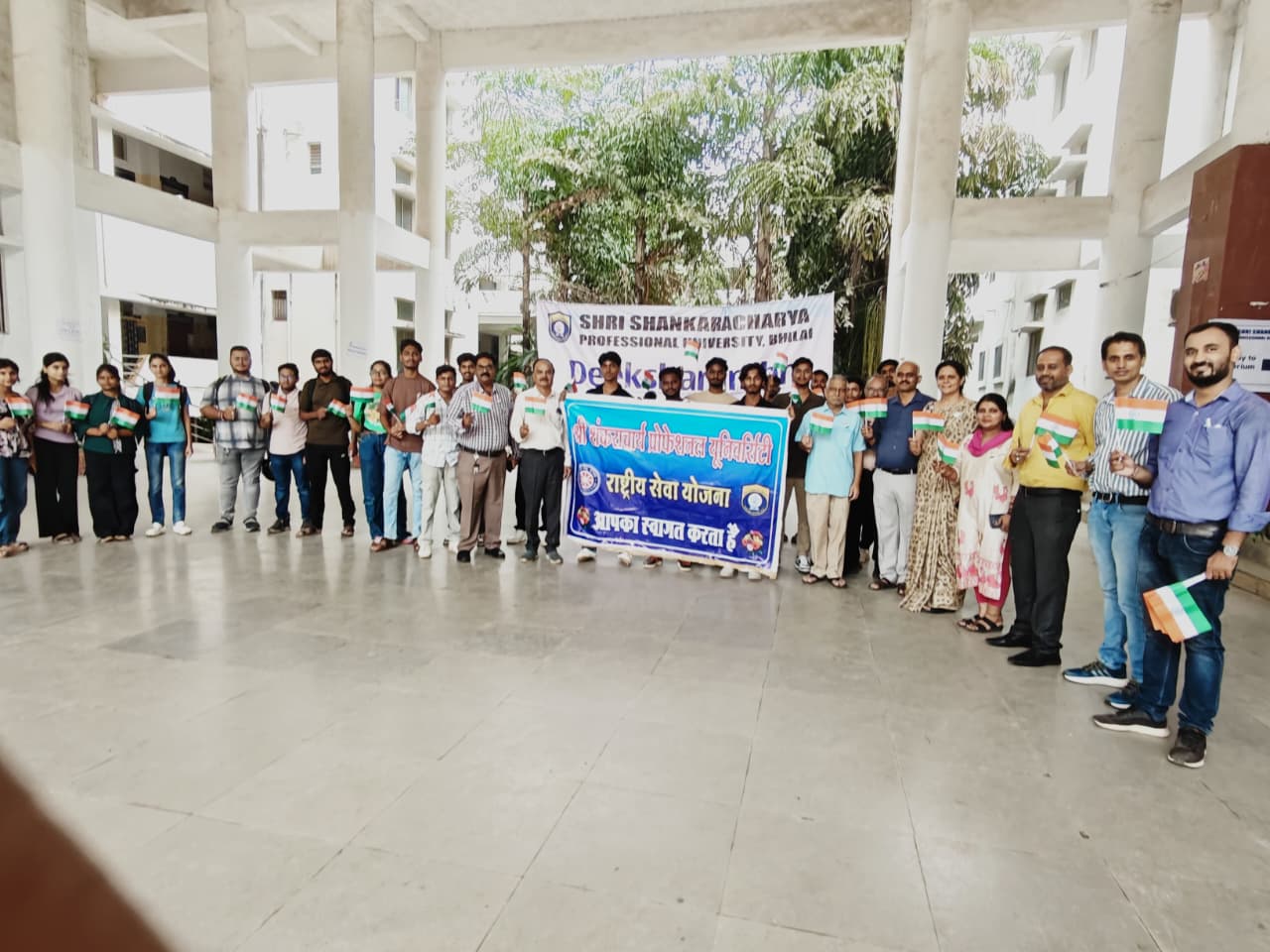
NSS unit of SSIPSR has organized an awareness program on world dengue day. on this day our NSS unit was spread the village chikhli and aware about cause of dengue and distributed the medicine. Our NSS unit Incharege Mr Ashutosh Patankar & Mr. Lokesh Kumar, Assistant professor have coordinated the activity.
 NSS unit of SSIPSR actively participated in SSPU NSS activity. During these program UNESCO coordinators met and educated our students regarding social activity.
NSS unit of SSIPSR actively participated in SSPU NSS activity. During these program UNESCO coordinators met and educated our students regarding social activity.


Alumni Association
Alumni:- Alumni Cell, the single point of contact between Alumni and Institute, offers our alumni a host of services that helps them keep in touch with their batch mates and also keep them updated on campus happenings.
|
S.N. |
NAME OF COMMITTEE MEMBER |
DESIGNATION |
|
|
1 |
Dr. Hemant R. Badwaik |
Chairman |
|
|
2 |
Dr. Alok Singh Thakur |
Vice- Chairman |
|
|
3 |
Mr. Narendra Kumar |
Secretary |
|
|
4 |
Ms. Dhanush Ram Turkane |
Head of Programme |
|
|
5 |
Mrs. Pali Khobragade |
Head of Publicity |
|
|
6 |
Mr. Ashutosh Patankar |
Head of Membership |
|
|
7 |
Mr. Rahul Singh Rajput |
Member |
|
|
8 |
Ms. Laxmi Yadav |
Member |
|
|
9 |
Mr. Umesh Chandra |
Member |
|
|
10 |
Ms. Priyanka |
Member |
|
|
11 |
Ms. Aditi Verma |
Member |
ANNUAL EVENTS
- Technical event
- Social event
- Sports event
- Students Felicitations
- Hospital and Industrial visit
- Campus Placement
- Industrial Tour
- Vasant Panchami
- Holi Milan
- Diwali Milan
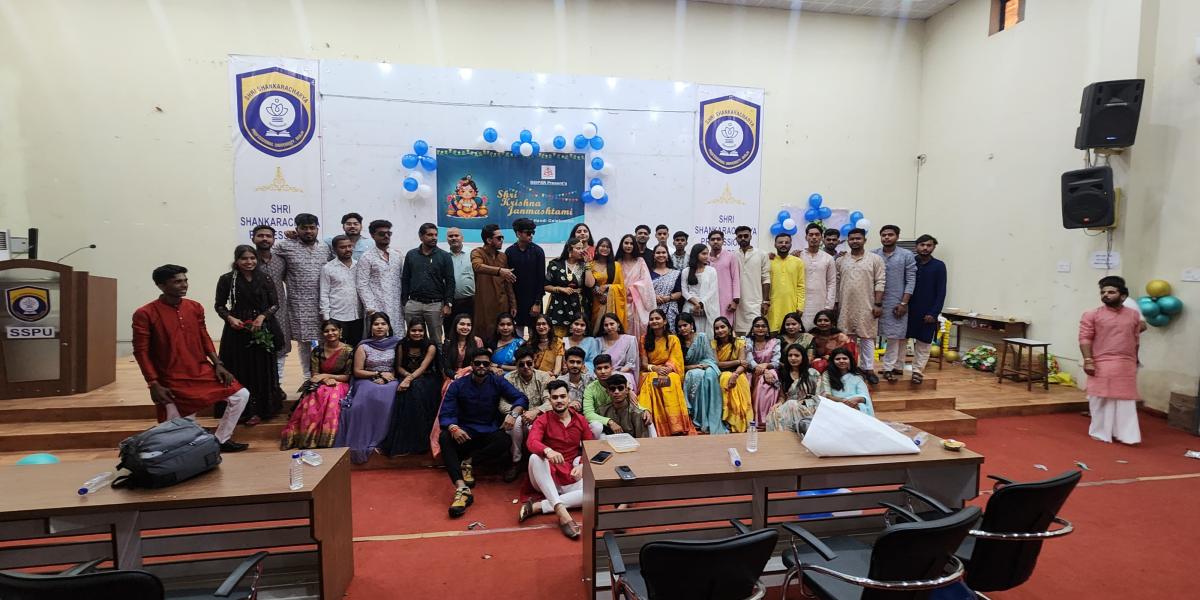
Krishna Janmastami 2024
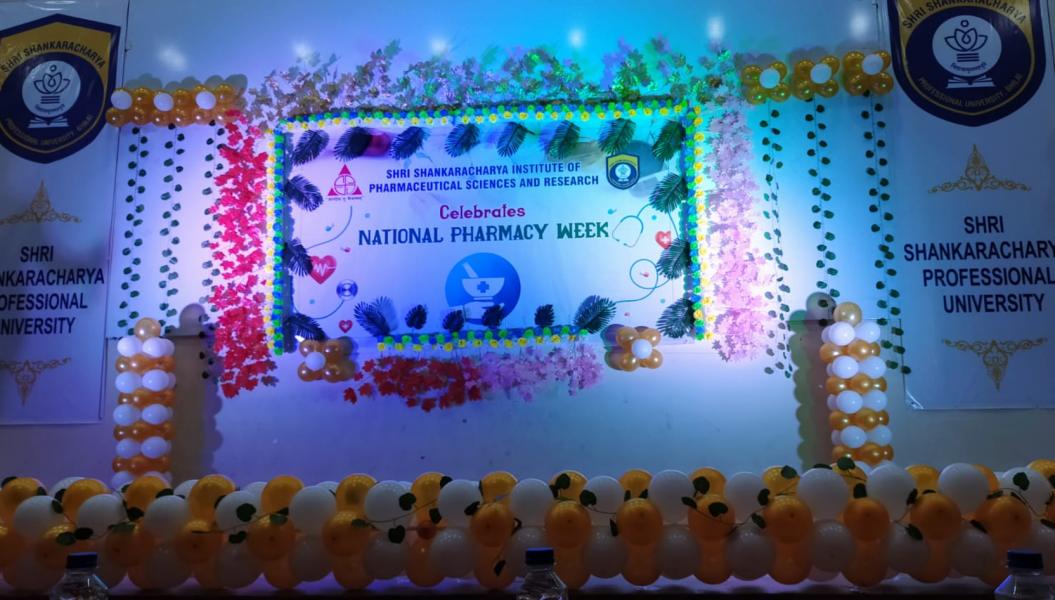
National Pharmacy Week Celebration
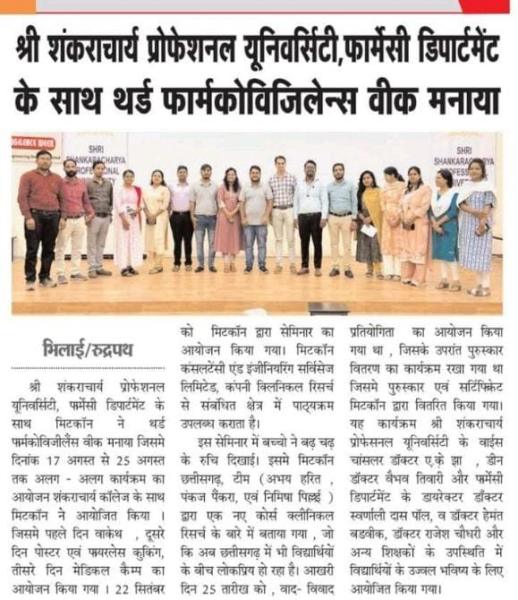
Pharmacovigilance Day
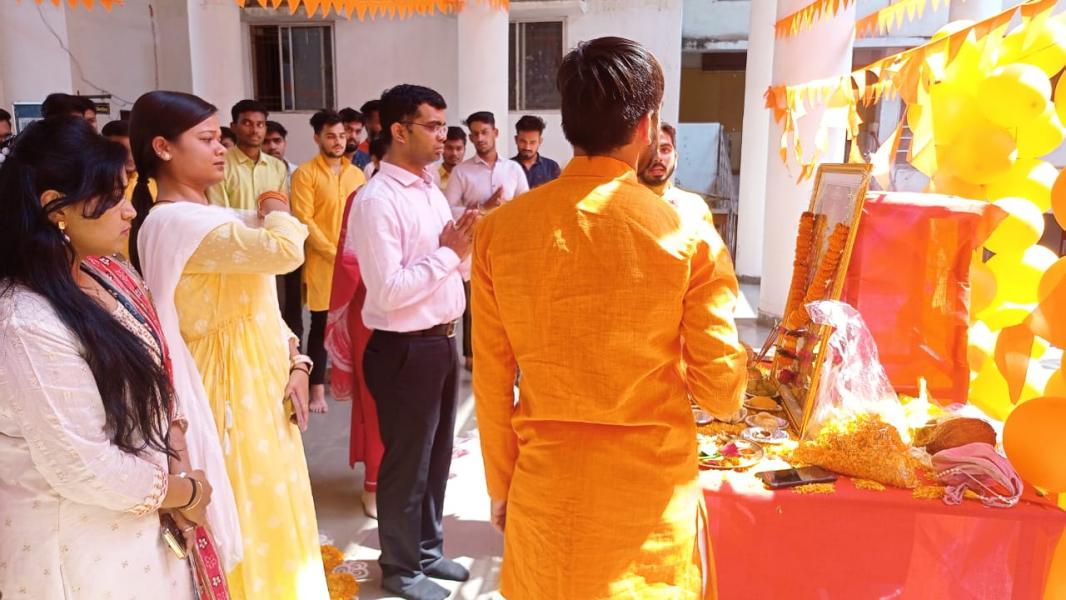
Ram Navami 2024
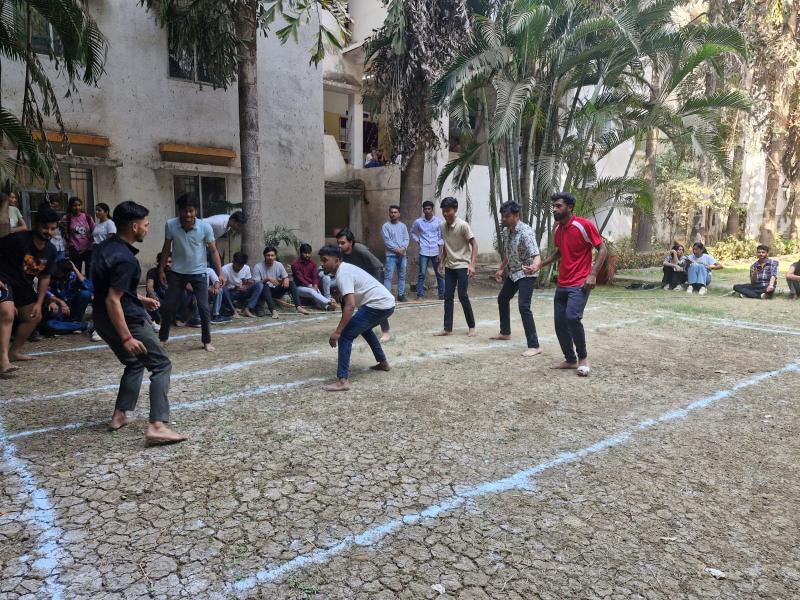
Sports Day Celebration
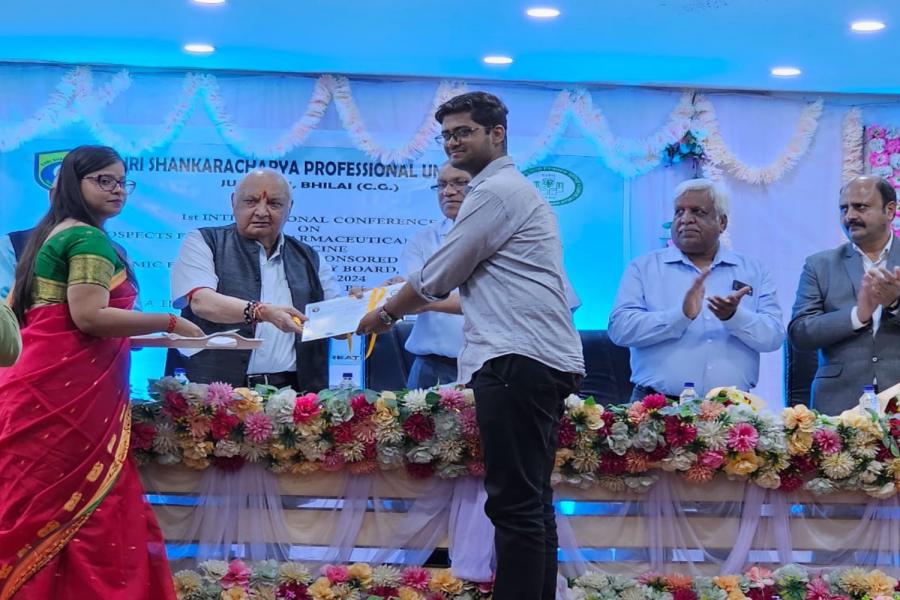
Students Felicitations
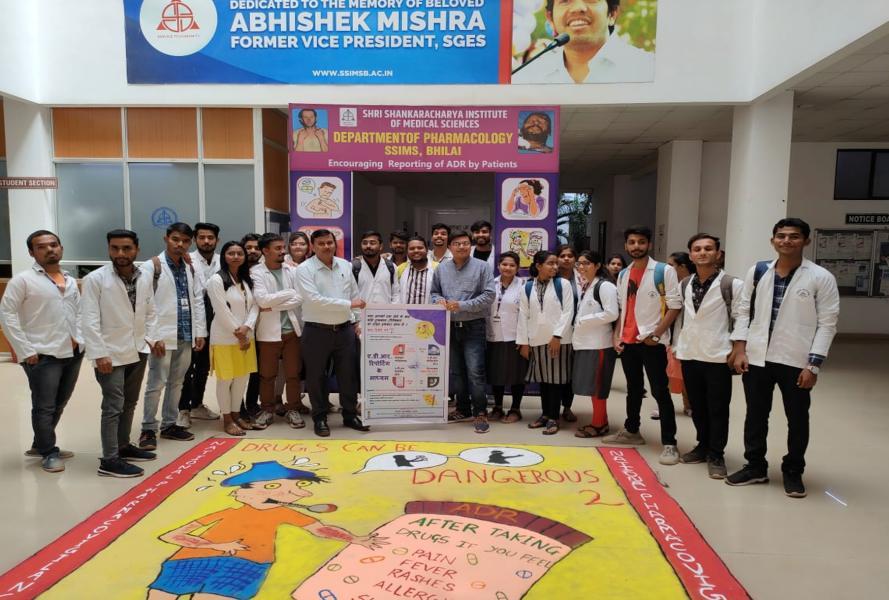
World Pharmacist Day
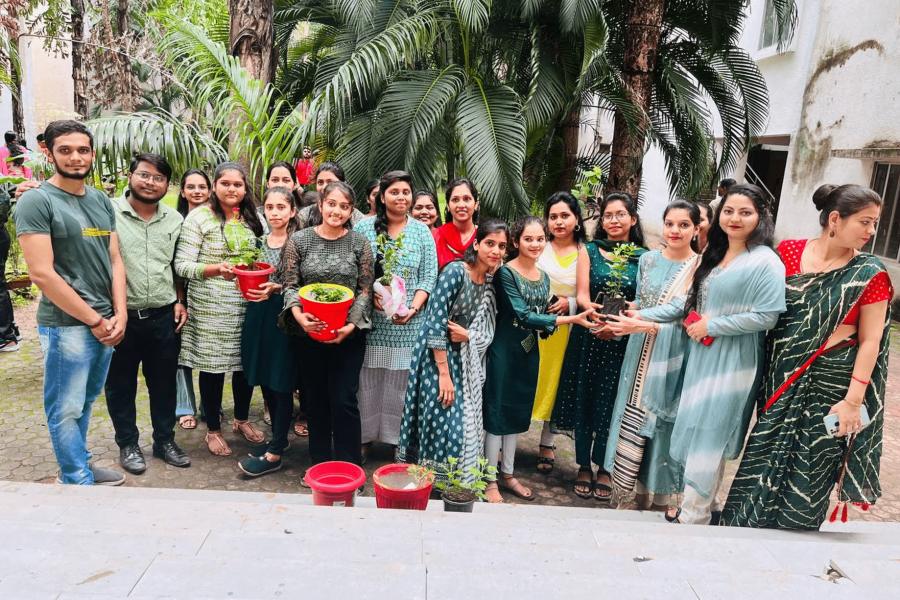
World Plantation Day
Anti Ragging Details
1800-180-5522
helpline@antiragging.in
CONTACT INFO
Shri Shankaracharya Institute of Pharmaceutical Sciences and Research
Junwani, Bhilai, Chhattisgarh- 490020
Contact: 7879059209
Email: ssipsrbhilai@gmail.com

Shri Shankaracharya College of Pharmaceutical Sciences
The First University in India to be named after ADI- SHRI SHANKARACHARYA and blessed by all present Jagadgurus.
Shri Shankaracharya College of Pharmaceutical Sciences (SSCPS) was established in 2019 to inculcate professionally competent manpower in the field of pharmaceutical sciences. The institute has the necessary infrastructure and approval from the Pharmacy Council of India (PCI). It is affiliated with Chhattisgarh Swami Vivekananda Technical University (CSVTU), Bhilai, Chhattisgarh, till 2025. Additionally, in 2023 it became a constituent college under Shri Shankaracharya Professional University (SSPU), Bhilai. Shri Shankaracharya Professional University (SSPU) is the first university in India to be named after Adi-Shri Shankaracharya and blessed by all present Jagadgurus. This university was established on June 9, 2020, under the Chhattisgarh Private University (Establishment and Operation) Act, 2005 (No.13 of 2005) vide amendment Act 2020 (No. 12 of 2020) as Shri Shankaracharya Professional University (SSPU), Bhilai.
SSCPS is the pioneer institute in the state of Chhattisgarh. The institute provides pharmacy courses such as D.Pharm. and B.Pharm. The institute has highly qualified faculty members with expertise in their respective areas. The faculty of the institute is actively involved in research activities. Faculty members have been invited to deliver invited talks at various conferences. Faculty members have published more than seventy international and national papers in various reputed journals. The institute has a well-established laboratory and library with all the necessary instruments and books. Our institute is honoured with the award for excellent contribution in pharmaceutical education and research in Healthcare leadership conclave and awards held at Delhi, 2021. This is the only college in Chhattisgarh who received the approved Adverse Drug Reactions Monitoring Centre (AMCs) by National Coordinating Centre (NCC) - Pharmacovigilance Programme of India (PvPI), Indian Pharmacopoeia Commission (IPC), Ghaziabad.
Institute Highlights
- Established in 2019
- Approved by Pharmacy Council of India (PCI), New Delhi
- Affiliated to Chhattisgarh Swami Vivekananda Technical University (CSVTU), Bhilai
- Constituent college under Shri Shankaracharya Professional University (SSPU), Bhilai.
- Qualified Faculties
- Digital Classrooms
- Enlightening and Enriching Academic Ambience
- Equipped Laboratory and Library
- Wi-Fi Campus
- Hi-Tech Audio-Visual Section
- Top notch placements
- Government funded national projects and seminar grants
- More than 15 Indian patents published and granted
- ADR monitoring centre approved by Indian pharmacopeia commission
- Hospital internship facility
- Industrial training and visit programs
Programmes Offered
|
Programme |
Duration |
Mode |
Eligibility |
Tuition Fees |
|
Diploma in Pharmacy [D.Pharm] |
2 years |
Yearly |
10 + 2 or equivalent |
Rs. 57,000/- per year |
|
Bachelor of Pharmacy [B.Pharm] |
4 years |
Semester |
10 + 2 or equivalent |
Rs. 37,000/- per semester |
|
Master in Pharmacy [M.Pharm] |
2 years |
Semester |
B.Pharm with or without GPAT |
Rs. 50,000/- per semester |
|
Ph.D. in Pharmaceutical Sciences |
- |
- |
As per UGC norms |
Rs. 2,57,000/- (Total) |
Publication Metrics

2 Indian patents are granted to Dr. Swarnali Das Paul
- Topical dosage form of apremilast for managing ocular hypertension (Application number: 202011034083, Patent number: 374314)
- Atazanavir nanocrystal formulation (Application number: 202011038816, Patent number: 393527)
6 patents are published by Dr. Swarnali Das Paul
- Novel delivery system of amfenac
- Colon targeted drug delivery system of anticancer bioactives
- Novel topical formulation with bioflavonoid for kangri cancer
- Nanodelivery system of a chemotherapeutic agent with herbal bioenhancer
- Development of bioflavonoid loaded nanoparticles for anticancer activity
- Formulation and evaluation of diacerin and hesperidine loaded nanocarrier system for topical use
9 patents are published by Mr. Jhakeshwar Prasad
- A Retroprospective Data analysis of Lung cancer related aspects
- Machine learning based big data analytics of patients suffering from cancer
- A machine learning based approach for early prediction of Neurodegenerative disorder
- Artificial intelligence based approach to analyse the neurological disorder that erupt during Covid-19 Pandemic
- Machine learning based approach to study and analyse the antibacterial effects of silver nanoparticles for healing dental issues
- Artificial intelligence based approach to analyse the therapeutic effect of drugs that are obtained from marine in the treatment of cancer
- Machine learning based approach to predict the various myelosuppression agent can be used along with hydroxyurea in improving the condition of sickle cell anemia
- Artificial intelligence based approach to study the impact of topical nano adjuvants for eradication of skin cancer
- Systematic framework integrated with machine learning approaches for identification and directed delivery of nanoparticles to tumour.
Paper publications in 2022
- 4 Papers are published by Dr. Swarnali Das Paul in international journals
- 3 Papers are published by Dr. Rajesh Choudhary in international journals
- 1 Paper is published by Mrs. Malti Sao in an international journal
- 2 Papers are published by Mr. Jhakeshwar Prasad in international journals
- 1 Paper is published by Mr. Siddharth Kumar Sahu in an international journal
ADVERSE DRUG REACTION MONITORING CENTRES (AMCs)
The National Coordinating Centre (NCC) - Pharmacovigilance Programme of India (PvPI), Indian Pharmacopoeia Commission (IPC), Ghaziabad has approved Shri Shankaracharya College of Pharmaceutical Sciences (SSCPS), Bhilai as Adverse Drug Reactions Monitoring Centre (AMCs).
Background
The Central Drugs Standard Control Organisation (CDSCO), New Delhi, under the aegis of Ministry of Health & Family Welfare, Government of India has initiated a nation-wide pharmacovigilance programme in July, 2010, with the All India Institute of Medical Sciences (AIIMS), New Delhi as the National Coordinating Centre (NCC) for monitoring Adverse Drug Reactions (ADR) in the country to safe-guard Public Health. In year 2010, 22 ADR monitoring centres (AMCs) including AIIMS, New Delhi had been set up under this Programme. To ensure implementation of this programme in a more effective way, the National Coordinating Centre was then shifted from the All India Institute of Medical Sciences (AIIMS), New Delhi to the Indian Pharmacopoeia Commission (IPC), Ghaziabad, (U.P.) in April, 2011.
The mission of Pharmacovigilance Programme of India (PvPI) is to safeguard the health of the Indian population by ensuring that the benefit of use of medicine outweighs the risks associated with its use. Since there exist considerable social and economic consequences of adverse drug reactions and the positive benefit/cost ratio of implementing appropriate risk management - there is a need to engage healthcare professionals and the public at large, in a well structured programme to build synergies for monitoring adverse drug reactions in the country.
The purpose of the PvPI is to collate data, analyze it and use the inferences to recommend informed regulatory interventions, besides communicating risks to healthcare professionals and the public. The broadened patient safety scope of pharmacovigilance includes the detection of medicines of substandard quality as well as prescribing, dispensing and administration errors. Counterfeiting, antimicrobial resistance, and the need for real time surveillance in mass vaccinations are other pharmacovigilance challenges which need to be addressed.
Scope and Objectives
- To create a nation-wide system for patient safety reporting
- To identify and analyze new signal from the reported cases
- To analyze the benefit - risk ratio of marketed medications
- To generate evidence based information on safety of medicines
- To support regulatory agencies in the decision-making process on use of medications
- To communicate the safety information on use of medicines to various stakeholders to minimize the risk
- To emerge as a national centre of excellence for pharmacovigilance activities
- To collaborate with other national centres for the exchange of information and data management
- To provide training and consultancy support to other national pharmacovigilance centres across globe
- To promote rational use of medicine
Events

National Pharmacy Week 2023
During National Pharmacy Week, SSCPS organized a pharma-expo, inter-college competitions, and cultural activities. The Indian Pharmaceutical Association celebrates National Pharmacy Week every year during the third week of November. The major focus of NPW celebrations is to create awareness amongst the public, other healthcare providers, and the authorities, about the NPW theme in particular. This is in addition to the pharmacy profession and the role of pharmacists in general. There was an Inter-College Competition on 25 November 2022 to mark National Pharmacy Week.
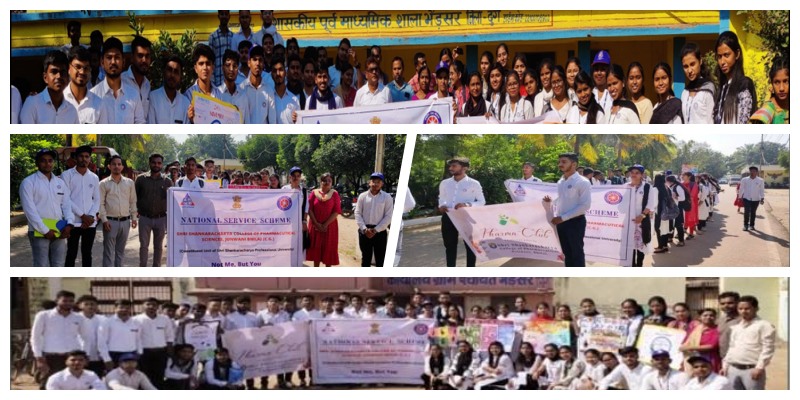
Diabetes Awareness Program
World Diabetes Day provides an opportunity to raise awareness of diabetes as a global public health issue. This is an opportunity to discuss what needs to be done, collectively and individually, for better prevention, diagnosis and management of the condition. SSCPS has organized a door to door awareness programme and Nukkad Natak about diabetes at Bhendsar village on 14 November.2022.

World Pharmacist Day
World Pharmacist Day 2022 & Pharma-Club Inauguration held on 26th September 2022.This year World Pharmacist Day started with some extra energetic words by our world famous speaker Dr. Kishore Dutta. Our Chief Guest Dr. J. P. Meshram Sir, CMHO, District Hospital, Durg inaugurated the Pharma-Club on this special day.

Medical Camp
The National Service Scheme team from SSCPS & SSPU organized a medical camp with some major body checkups on 7 October. These events are inaugurated with the blessing of Shri IP Mishra sir and he delivers a motivational speech to the volunteers & the team. We are particularly thankful to the deputy registrar of SSPU, the principal of SSCPS, and the doctors and nurses of SSIMS Bhilai.

National Pharmacovigilance Week 2022
During the Pharmacovigilance week, students and members of the NSS_SSCPS unit visited High & Higher Secondary Schools and presented their vision of the Pharmacovigilance Program through pamphlets and Nukkad Natak performance. The event aims to improve patient safety and welfare by monitoring drug safety and reducing medication-related risks in the Indian population.
Awarded for Excellent contribution of Pharmacovigilance awareness Program by Indian Pharmacopeia commission at New Delhi.
Dr. Swarnali Das received an award for her excellent contribution to the pharmacovigilance awareness program at the Healthcopia conclave in Delhi on November 25, 2021.
Industry Visit by Students in the year 2022-2023
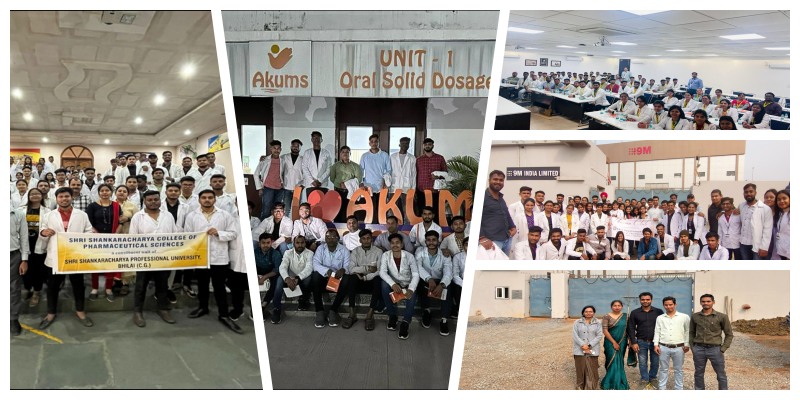
Akums Drugs & Pharmaceuticals Limited, Haridwar:
Akums Drugs & Pharmaceuticals Limited is an internationally recognized WHO-GMP-certified contract manufacturer of pharmaceuticals. Akums has rapidly emerged as the premier integrated pharmaceutical company in India. Its business focus is on manufacturing & marketing pharmaceutical products along with serving clients across the globe. Akums is India’s single largest Contract Research and Manufacturing (CRAMS) organization responsible for manufacturing approximately 11-12 % of all drugs consumed in the country. The organization offers a comprehensive range of services starting from formulation development to market launch. Akums has emerged as an integrated solution provider for companies seeking specific development and business goals. Along with its core service offering, the company offers advanced solutions for formulation development and testing. Akums's total revenue stood at more than INR 21 Billion in the financial year 2019-20, growing at a rate of more than 20% over the past year.
The SSCPS organized a visit to an industrial facility for B.Pharm VII students from 12-18 December 2022 at Akums Drugs & Pharmaceuticals Ltd, Haridwar.
9M India Private Limited, Raipur
9M India Private Limited is a private company. It is a non-government company registered with the Registrar of Companies of Chattisgarh State. At the time of registration, 9M India Private Limited had an authorized share capital of Rs. 1000000 and a paid-up capital of Rs. 50000. The company is engaged in automotive and special pharmaceutical products, as well as branded and industrial products.
Ganesh Bakery Pvt. Ltd. (Parle-G) Raipur

Pharma-Club Inauguration
The inauguration of Pharma-Club took place on 26th September with Chief Guest, Dr. JP Meshram Sir, CMHO, District Hospital, Durg.
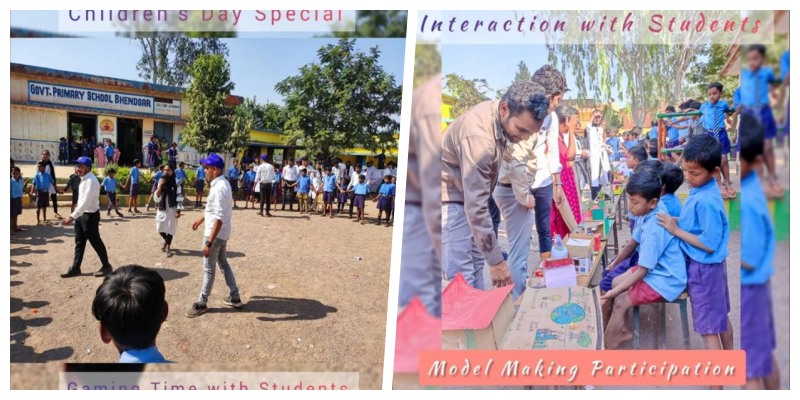
Children’s Day Program
Children's Day is celebrated across India to raise awareness about the rights, education, and welfare of children. It is celebrated on 14 November every year on the birthday of the First Prime Minister of India, Pandit Jawaharlal Nehru. He was known to be fond of children.
In celebration of Children's Day on 14th November, our Units of NSS_SSCPS & Pharma-Club gathered with students, played some difficult games, and had fun. Students from the school have also prepared mindfulness models that have a special effect on everyone.
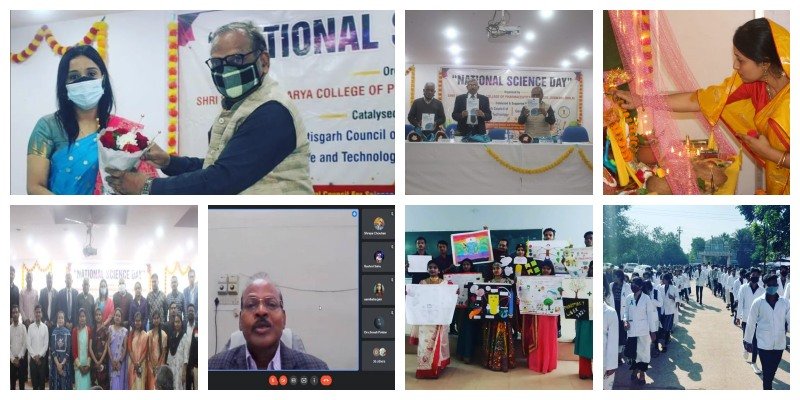
National Science Day
On the occasion of National Science day, a national level conference and competitions was organized. The whole program was conducted in a hybrid mode (online for outer candidates and offline for institute level) on 21st January at Shri Shankaracharya College of Pharmaceuticals Sciences, Bhilai. The theme for science day was ‘Integrated approach in science & technology for sustainable future’.
In the morning more than 400 participants across India participated in the event and the speakers: Dr. V K Maurya, Dr. Deependra Singh and Dr. Shekhar Verma shared their illuminating views on the topic through online mode. Inauguration was done by Dr. A.K Jha, Principal, FPS-SSGI, Smt. Jaya Mishra, President of SGES and all other faculty members of SSCPS. A national level e- Competition was organized. The session was conducted on Hybrid Mode under the guidance of Dr. Swarnali Das Paul (Principal and Professor of SSCPS College), convener of the event. There were three competitions: 1. Oral presentation, poster making and model making.
Post lunch valedictory session was organised in the presence of (online) Special guest- Dr. Shailendra Saraf, ex vice president pharmacy council of India & Dr. V D Rangari, dean school of natural resources, Guru Ghasidas central university. Chief patron and Chairman of SGES, Shri I.P. Mishra delivered a dynamic speech on this occasion. In the valedictory function prizes were distributed to the winners (best three) for three competitions. Most of them were present physically. Aditya Mishra from FPS-SSGI College won the first prize in oral presentation and Samiksha Jain from Sanskar City College won the best prize for e-poster while in model making Kirti Chandravanshi from Govt College, Kabirdham bagged the best prize. Each of the 1st prize winners was delivered 2000 cash prize along with memento. The second and third prize winners were presented memento and prizes. The program was supported and catalyzed by Chhattisgarh council of science and technology and department of science and technology, Govt of India.

Webinars
SSCPS organized an international webinar on "Career Opportunities in Pharmacy" on August 14, 2021. Dr. Payal Ganguly (UK), Mr. Mukesh Tiwari (Mumbai), and Dr. Parmanand Verma, Drug Inspector (Raipur), delivered their lectures on this webinar. Over 400 participants from all over India attended this lecture series. The inauguration was done by Dr. A.K. Jha, Principal, FPS-SSGI, Smt. Jaya Mishra, President of SGES, and all other faculty members of SSCPS. The convener of the event, Dr. Swarnali Das Paul (Principal and Professor at SSCPS College), led the session. The inauguration of the session was conducted in the presence of Dr. Swarnalata Saraf, Dean, School of Pharmacy, Pt. Ravishankar Shukla University, Raipur (Chief Guest). Chief patron and Chairman of SGES, Shri I.P. Mishra delivered a dynamic speech on this occasion.
SSCPS has organized an international webinar on "Career Opportunities in Pharmacy" on November 13, 2021. Dr. Sanjoy Kumar Pal (South Africa) and Mr. Baljeet Singh (Raipur), delivered their lectures on this webinar. Over 450 participants from all over India attended this lecture series. The inauguration was done by Dr. A.K. Jha, Principal, FPS-SSGI, Smt. Jaya Mishra, President of SGES, and all other faculty members of SSCPS. The convener of the event, Dr. Swarnali Das Paul (Principal and Professor at SSCPS College), led the session. The inauguration of the session was conducted in the presence of Mr. Sacheen Gandhi, Director, IBH Ltd., London (Chief Guest). Chief patron and Chairman of SGES, Shri I.P. Mishra delivered a dynamic speech on this occasion.
Achievements
FACULTY ACHIEVEMENTS
- More than 70 research articles are published in national and international journals.
- More than 10 books and 25 book chapters are published by national and international publishers
- More than 30 research outcomes are presented in national and international conferences
- More than 15 patents are published in Indian patent office
STUDENTS ACHIEVEMENTS
- Bhavesh Sahu is a class topper in B. Pharm., Batch 2019-23.
- Alok Yadav is a class topper in D. Pharm., Batch 2019-23
- Bhavesh Sahu got first prize in Pharma-Expo competition on Pharmacist Day
- Aditya Khoshle and groups got first prize in Quiz competition on Pharmacist Day
- Pankaj Ku. Kashyap and Vaishali Verma got prize in Rangoli competition on Pharmacist Day
- Several Students actively participate in Nation Service Scheme (NSS).
Syllabus
Click here to Download Syllabus of B.Pharma
Click here to Download Ordinance and Syllabus of D.Pharma
Click here to Download Ordinance and Syllabus of B.Pharm/ D.Pharm
Facilities

Auditorium

Bank

Campus

Campus

Herbal Garden

Hospital

Laboratory
NSS

NSS

Pharma Club

Run for Unity

Save Environment

Nukkad Natak
Sports

National Pharmacy Week

National Pharmacy Week

National Pharmacy Week
Result Analysis - Academic Session 2023-24
|
SN |
Course |
Total Student Appeared |
Total Student Passed |
Total Student Failed |
|
1 |
B.Pharm |
365 |
277 |
88 |
|
2 |
D.Pharm |
100 |
88 |
12 |
|
3 |
M.Pharm Pharmaceutics |
14 |
13 |
1 |
SIF Report 2022-23
SIF Report 2026
Student Enrolled in Academic Session 2023-24
Contact Us
Shri Shankaracharya College of Pharmaceutical Sciences
Shri Shankaracharya Professional University, Bhilai
Reach us on 9977258200, 9827954319
Email us on sscpsbhilai@gmail.com

